许国璋英语第一册第十四课课文、对话、练习、答案
- 格式:docx
- 大小:42.64 KB
- 文档页数:12
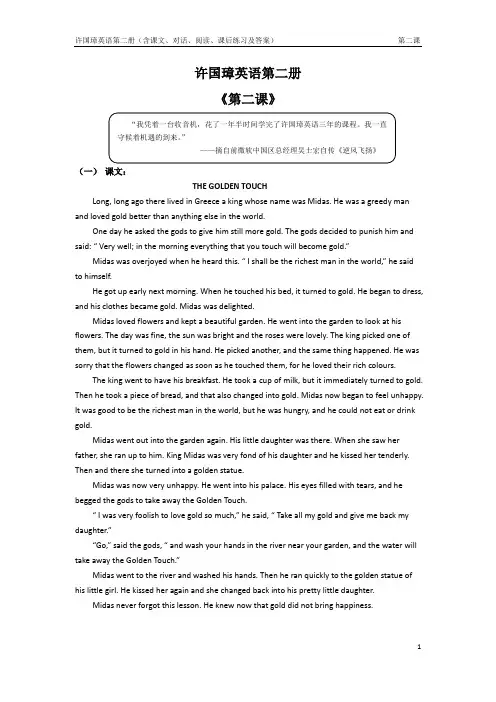
许国璋英语第二册《第二课》(一)课文:THE GOLDEN TOUCHLong, long ago there lived in Greece a king whose name was Midas. He was a greedy man and loved gold better than anything else in the world.One day he asked the gods to give him still more gold. The gods decided to punish him and said: “ Very well; in the morning everything that you touch will become gold.”Midas was overjoyed when he heard this. “ I shall be the richest man in the world,” he said to himself.He got up early next morning. When he touched his bed, it turned to gold. He began to dress, and his clothes became gold. Midas was delighted.Midas loved flowers and kept a beautiful garden. He went into the garden to look at his flowers. The day was fine, the sun was bright and the roses were lovely. The king picked one of them, but it turned to gold in his hand. He picked another, and the same thing happened. He was sorry that the flowers changed as soon as he touched them, for he loved their rich colours.The king went to have his breakfast. He took a cup of milk, but it immediately turned to gold. Then he took a piece of bread, and that also changed into gold. Midas now began to feel unhappy. It was good to be the richest man in the world, but he was hungry, and he could not eat or drink gold.Midas went out into the garden again. His little daughter was there. When she saw her father, she ran up to him. King Midas was very fond of his daughter and he kissed her tenderly. Then and there she turned into a golden statue.Midas was now very unhappy. He went into his palace. His eyes filled with tears, and he begged the gods to take away the Golden Touch.“ I was very foolish to love gold so much,” he said, “ Take all my gold and give me back my daughter.”“Go,” said the gods, “ and wash your hands in the river near your garden, and the water will take away the Golden Touch.”Midas went to the river and washed his hands. Then he ran quickly to the golden statue of his little girl. He kissed her again and she changed back into his pretty little daughter.Midas never forgot this lesson. He knew now that gold did not bring happiness.(二)课文译文点金术很久很久以前,在希腊居住着一位名叫迈达斯的国王。

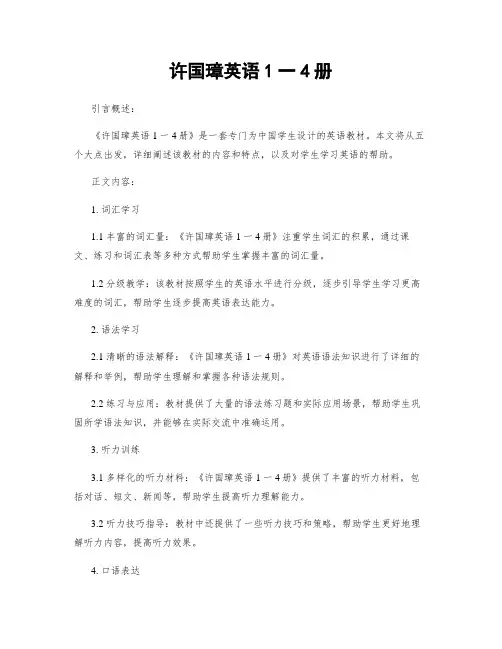
许国璋英语1一4册引言概述:《许国璋英语1一4册》是一套专门为中国学生设计的英语教材。
本文将从五个大点出发,详细阐述该教材的内容和特点,以及对学生学习英语的帮助。
正文内容:1. 词汇学习1.1 丰富的词汇量:《许国璋英语1一4册》注重学生词汇的积累,通过课文、练习和词汇表等多种方式帮助学生掌握丰富的词汇量。
1.2 分级教学:该教材按照学生的英语水平进行分级,逐步引导学生学习更高难度的词汇,帮助学生逐步提高英语表达能力。
2. 语法学习2.1 清晰的语法解释:《许国璋英语1一4册》对英语语法知识进行了详细的解释和举例,帮助学生理解和掌握各种语法规则。
2.2 练习与应用:教材提供了大量的语法练习题和实际应用场景,帮助学生巩固所学语法知识,并能够在实际交流中准确运用。
3. 听力训练3.1 多样化的听力材料:《许国璋英语1一4册》提供了丰富的听力材料,包括对话、短文、新闻等,帮助学生提高听力理解能力。
3.2 听力技巧指导:教材中还提供了一些听力技巧和策略,帮助学生更好地理解听力内容,提高听力效果。
4. 口语表达4.1 实用的口语表达:教材注重培养学生的口语交际能力,提供了大量实用的口语表达,帮助学生在日常生活和学习中更自如地运用英语进行交流。
4.2 对话和角色扮演:教材通过对话和角色扮演的方式,激发学生的兴趣,提高他们的口语表达能力。
5. 阅读理解5.1 多样的阅读材料:教材中提供了各种各样的阅读材料,包括文章、故事、新闻等,帮助学生提高阅读理解能力。
5.2 阅读技巧训练:教材还注重培养学生的阅读技巧,通过练习题和指导,帮助学生提高阅读速度和准确性。
总结:综上所述,《许国璋英语1一4册》是一套内容丰富、结构合理的英语教材。
通过词汇学习、语法学习、听力训练、口语表达和阅读理解等五个大点,该教材全面提高学生的英语能力。
无论是词汇量的积累,还是语法知识的掌握,通过丰富的听力材料和口语表达练习,再到阅读理解的训练,都能够帮助学生更好地学习和运用英语,提高他们的综合英语能力。
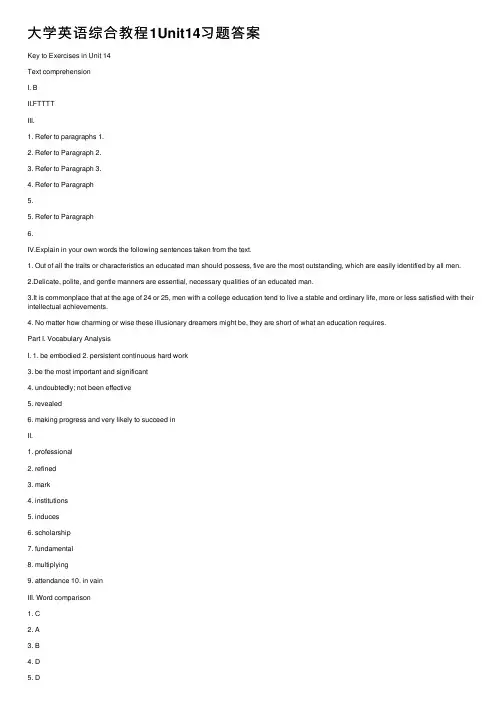
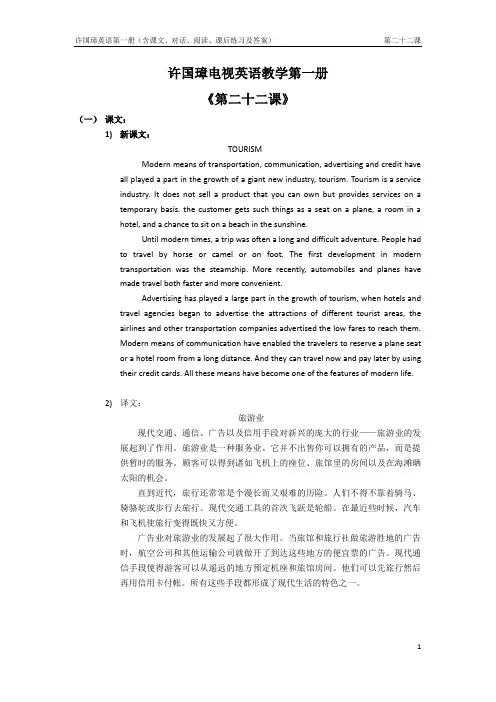
许国璋电视英语教学第一册《第二十二课》(一)课文:1)新课文:TOURISMModern means of transportation, communication, advertising and credit have all played a part in the growth of a giant new industry, tourism. Tourism is a serviceindustry. It does not sell a product that you can own but provides services on atemporary basis. the customer gets such things as a seat on a plane, a room in ahotel, and a chance to sit on a beach in the sunshine.Until modern times, a trip was often a long and difficult adventure. People had to travel by horse or camel or on foot. The first development in moderntransportation was the steamship. More recently, automobiles and planes havemade travel both faster and more convenient.Advertising has played a large part in the growth of tourism, when hotels and travel agencies began to advertise the attractions of different tourist areas, theairlines and other transportation companies advertised the low fares to reach them.Modern means of communication have enabled the travelers to reserve a plane seator a hotel room from a long distance. And they can travel now and pay later by usingtheir credit cards. All these means have become one of the features of modern life.2)译文:旅游业现代交通、通信、广告以及信用手段对新兴的庞大的行业——旅游业的发展起到了作用。
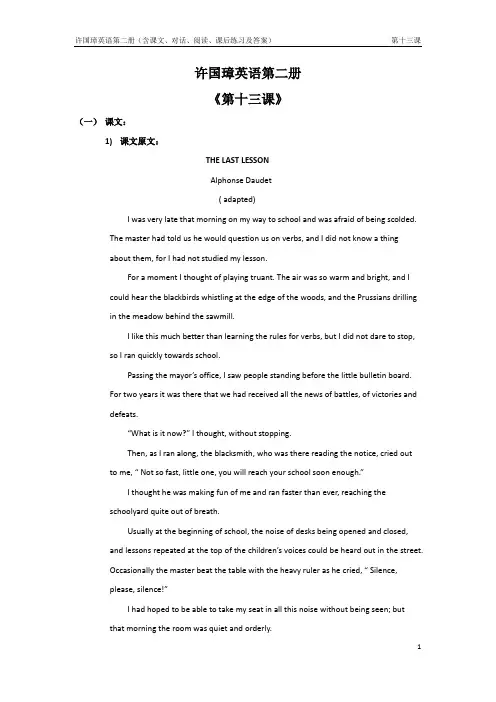
许国璋英语第二册《第十三课》(一)课文:1)课文原文:THE LAST LESSONAlphonse Daudet( adapted)I was very late that morning on my way to school and was afraid of being scolded.The master had told us he would question us on verbs, and I did not know a thingabout them, for I had not studied my lesson.For a moment I thought of playing truant. The air was so warm and bright, and I could hear the blackbirds whistling at the edge of the woods, and the Prussians drillingin the meadow behind the sawmill.I like this much better than learning the rules for verbs, but I did not dare to stop,so I ran quickly towards school.Passing the mayor’s office, I saw people standing before the little bulletin board.For two years it was there that we had received all the news of battles, of victories anddefeats.“What is it now?” I thought, without stopping.Then, as I ran along, the blacksmith, who was there reading the notice, cried out to me, “ Not so fast, little one, you will reach your school soon enough.”I thought he was making fun of me and ran faster than ever, reaching theschoolyard quite out of breath.Usually at the beginning of school, the noise of desks being opened and closed, and lessons repeated at the top of the children’s voices could be heard out in the street.Occasionally the master beat the table with the heavy ruler as he cried, “ Silence,please, silence!”I had hoped to be able to take my seat in all this noise without being seen; butthat morning the room was quiet and orderly.Through the open window I saw my schoolmates already in their places. The master was walking up and down the room with the iron ruler under his arm and a book in his hand.As I entered he looked at me kindly, and said, without scolding,” Go quickly to your place, little Franz; we were going to begin without you. You should have been here five minutes ago.”I climbed over my bench and sat down at once at my desk. Just then I noticed, for the first time, that our master wore his fine green coat and his black silk embroidered cap.But what surprised me most was to see some of the village people seated on the benches at the end of the room. One of them was holding an old spelling book on his knee; and they all looked sadly at the master.While I was wondering at this, our schoolmaster took his place. “ Children,” he said, “ this is the last time that I shall give you a lesson. An order has come from Berlin that no language but German may be taught in the schools of Alsace and Lorraine. A new master will come tomorrow who will teach you German. Today is your last lesson in French. I beg you to pay attention.”These words frightened me. This was what they had posted on the bulletin board then! This was what the blacksmith was reading!(to be continued)2)全文译文:最后一课阿方斯·都德(改写)那天早上我很晚才去上学,心中害怕要挨训斥。
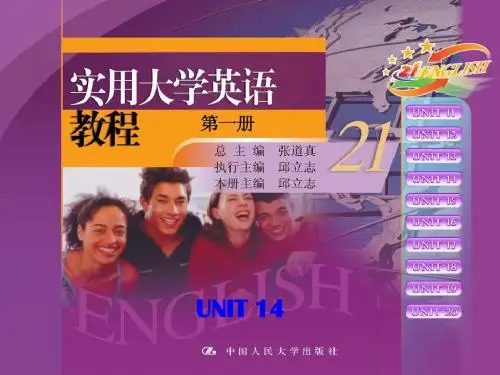
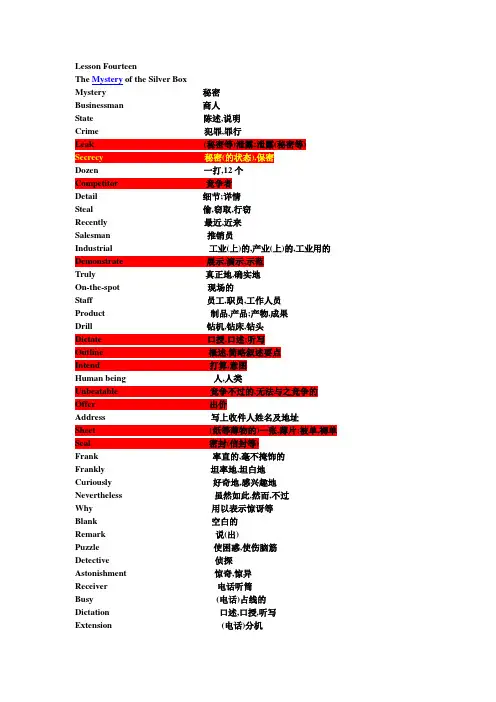
Lesson FourteenThe Mystery of the Silver BoxMystery 秘密Businessman 商人State 陈述,说明Crime 犯罪,罪行Leak (秘密等)泄露;泄露(秘密等) Secrecy 秘密(的状态),保密Dozen 一打,12个Competitor 竞争者Detail 细节;详情Steal 偷,窃取,行窃Recently 最近,近来Salesman 推销员Industrial 工业(上)的,产业(上)的,工业用的Demonstrate 展示,演示,示范Truly 真正地,确实地On-the-spot 现场的Staff 员工,职员,工作人员Product 制品,产品;产物,成果Drill 钻机,钻床,钻头Dictate 口授,口述;听写Outline 概述,简略叙述要点Intend 打算,意图Human being 人,人类Unbeatable 竞争不过的,无法与之竞争的Offer 出价Address 写上收件人姓名及地址Sheet (纸等薄物的)一张,薄片;被单,褥单Seal 密封(信封等)Frank 率直的,毫不掩饰的Frankly 坦率地,坦白地Curiously 好奇地,感兴趣地Nevertheless 虽然如此,然而,不过Why 用以表示惊讶等Blank 空白的Remark 说(出)Puzzle 使困惑,使伤脑筋Detective 侦探Astonishment 惊奇,惊异Receiver 电话听筒Busy (电话)占线的Dictation 口述,口授,听写Extension (电话)分机Attach 安装,系上,缚上Tremble (因恐惧、寒冷、虚弱等)颤抖Weakly 无力地Connection 联络;连接Useful ExpressionsTurn to 转向As many/much as 多达, ……之多At first 首先,起先At a …..price 以……的价格Hear of /about 听到……关于……Give orders (to do sth.) 下令(做某事)Attach to 安装上,系或缚上Look on 旁观(be) at stake 濒临危险,生死攸关A hundred lives are at stake now.In detail 详细的The soldier reported what he had seen to the general in detail.In time (for sb to do ) 即使,赶上He is back in time for the meeting.Carry out 执行,贯彻He refused to carry out orders which he thought were wrong.Or so 大约,左右I need twenty or so students to help me.Work out 弄明白,推算出Can you work out the meaning of the word in this context?Hang up 挂上电话He hung up when he recognized the voice at the other end of the phone.Might ( just) as well do sth. 不妨,不如Since you need the book badly, you might just as well buy a copy though it is expensive.Translate1)这本书花了我10元钱This book costs me ten yuan.2)他转向经理大声嚷道: “可是我们的工作快要保不住了!”He turned to the manager and said in loud voice: “but our work is at stake.”3),让我来判断谁是谁非Say it to me in detail. I’4)那时候计算机还是新事物,我花高价买了一台.At that time, the computers were new things and I bought one at a high price.5)这位总统头上挨了一枪,当即死亡6)买这辆旧自行车我花了150元左右I spent 150 yuan or so on this used bike.7)无论干什么工作,我们都应履行自己的职责.Whatever work we do, we should carry out our duty.8)起先,没有人能弄懂死者留下的秘密留言At first, no one understood the secret massage left by the dead.9)挂了电话我才想起忘了问他这件事.I didn’t remember to ask him about the matter until I hung up.10)他既不懂英语又不懂汉语.He doesn’t know Chinese as well as English.11)他回家正好赶上看电视台的国际新闻.He came home in time for watching the International News on TV.12)经理下星期才能回来.你不妨把东西放在秘书那里.Since the manager will be back next week, you might just as well give it to the secretary.21)我相信他是诚实的I believe him honest.2)这件外套可以使你暖和This coat may keep you warm.3)小男孩使他爷爷和奶奶生活得更高兴The little boy makes his grandparent’s life happy.4)那个老师把课讲得很有趣That teacher kept his class alive.5)警察到来时,发现那位老人已死了When the police came, the old man had been found dead.Questions on the text1)Who was Mr. Grayson? What did he sell? How did he sell them?He sold machines and tools used in factories.He sent his salesman to a new industrial area out West to demonstrate some new machines.2)Why was it important to keep his plans secret?Because his plans were large; he had millions of dollars at stake.If he did not keep his plans secret, he would lose much money.3)What had been happening over the last eight weeks?Half a dozen times over the last tight weeks, his plans had become known to his competitors , even in smallest detail, and in time for his competitors to steal his customers.4)Who was The Thinking Machine? What did Mr. Grayson want him to do?The Thinking Machine was a detective.Mr. Grayson wanted him to find out how and when information was leaking from his office.5)Who else knew of Mr. Grayson’s plans before he gave orders to carry them out?Mr. Grayson’s personal secretary, Evelyn Winthrop knew his plans before he gave orders to carry them out.6)How long had Miss Winthrop worked for Mr. Grayson? He trusted her, didn’t he? Howdid she get to know of his plans?Miss Winthrop had worked for Mr. Grayson for six years.Yes, he trusted her.Mr. Grayson dictated to Miss Winthrop in his office some letters of to his district managers.7)What was the most recent information leak at Mr. Grayson’s office?The most recent information was that he planned to sent salesmen to Okalahoma with new oil drills.8)What was so strange about this leak? What did Mr. Grayson plan to do in Oklahoma?What did he tell his district managers in the letters? Did any manager know the contents of all the letters? Did Mr. Grayson think Miss Winthrop might have told somebody about the plans?No one knew the contents of all the letters. Miss Winthrop and the businessman himself were the only two human beings who knew what was in them all. Neither of them left the office all day.9)What did The Thinking Machine do before he went to see Miss Winthrop?The Thinking to a desk, addressed an envelope, got a sheet of paper andthe envelope.10)What did she say when he handed the envelope to her? And what did she do?She repeated the name as if it sounded strange to her and said she didn’t think she knew him.11)What did The Thinking Machine find about the silver box beside Miss Winthrop’stelephone?The Thinking Machine found the telephone connection beside Miss Winthrop’s telephone. 12)How did The Thinking Machine find out the secret of the silver box? How had Mr.Grayson’s plans been reaching his business competitor?The Thinking Machine arranged for a secret extension to be attached to Miss Winthrop’s phone. The next morning he was at the extension, pencil in hand, while Mr. Grayson carried out his orders.His plans had been reaching his business competitor with the telephone connection.。
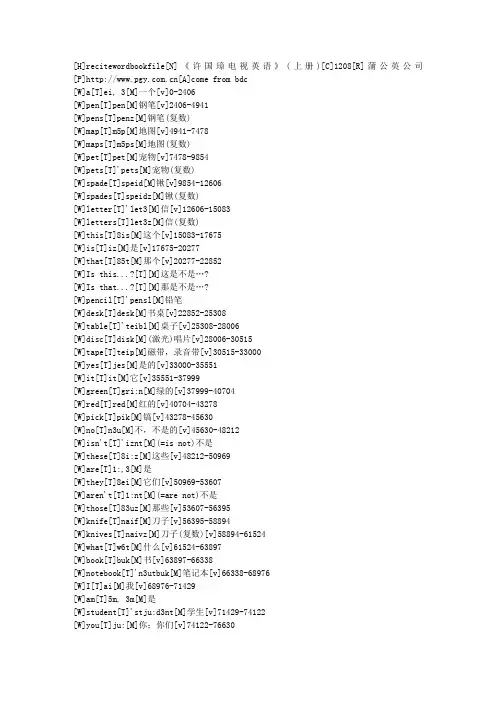
[H]recitewordbookfile[N]《许国璋电视英语》(上册)[C]1208[R]蒲公英公司[P][A]come from bdc[W]a[T]ei, 3[M]一个[v]0-2406[W]pen[T]pen[M]钢笔[v]2406-4941[W]pens[T]penz[M]钢笔(复数)[W]map[T]m5p[M]地图[v]4941-7478[W]maps[T]m5ps[M]地图(复数)[W]pet[T]pet[M]宠物[v]7478-9854[W]pets[T]'pets[M]宠物(复数)[W]spade[T]speid[M]锹[v]9854-12606[W]spades[T]speidz[M]锹(复数)[W]letter[T]'let3[M]信[v]12606-15083[W]letters[T]let3z[M]信(复数)[W]this[T]8is[M]这个[v]15083-17675[W]is[T]iz[M]是[v]17675-20277[W]that[T]85t[M]那个[v]20277-22852[W]Is this...?[T][M]这是不是…?[W]Is that...?[T][M]那是不是…?[W]pencil[T]'pensl[M]铅笔[W]desk[T]desk[M]书桌[v]22852-25308[W]table[T]'teibl[M]桌子[v]25308-28006[W]disc[T]disk[M](激光)唱片[v]28006-30515[W]tape[T]teip[M]磁带,录音带[v]30515-33000[W]yes[T]jes[M]是的[v]33000-35551[W]it[T]it[M]它[v]35551-37999[W]green[T]gri:n[M]绿的[v]37999-40704[W]red[T]red[M]红的[v]40704-43278[W]pick[T]pik[M]镐[v]43278-45630[W]no[T]n3u[M]不,不是的[v]45630-48212[W]isn't[T]'iznt[M](=is not)不是[W]these[T]8i:z[M]这些[v]48212-50969[W]are[T]1:,3[M]是[W]they[T]8ei[M]它们[v]50969-53607[W]aren't[T]1:nt[M](=are not)不是[W]those[T]83uz[M]那些[v]53607-56395[W]knife[T]naif[M]刀子[v]56395-58894[W]knives[T]naivz[M]刀子(复数)[v]58894-61524[W]what[T]w6t[M]什么[v]61524-63897[W]book[T]buk[M]书[v]63897-66338[W]notebook[T]'n3utbuk[M]笔记本[v]66338-68976[W]I[T]ai[M]我[v]68976-71429[W]am[T]5m, 3m[M]是[W]student[T]'stju:d3nt[M]学生[v]71429-74122[W]you[T]ju:[M]你;你们[v]74122-76630[W]teacher[T]'ti:t73[M]教员[v]76630-79211[W]he[T]hi:[M]他[v]79211-81663[W]she[T]7i:[M]她[v]81663-84342[W]farmer[T]'f1:m3[M]农民[v]84342-86983[W]doctor[T]'d6kt3[M]医生[v]86983-89551[W]nurse[T]n3:s[M]护士;保育员[v]89551-92171[W]we[T]wi:[M]我们[v]92171-94560[W]good morning[T][M](午前的问候语)[W]good[T]gud[M]好[v]94560-97089[W]morning[T]'m6:ni9[M]早晨;上午[v]97089-99712[W]good afternoon[T][M]午后的问候语[W]afternoon[T]'1:ft3'nu:n[M]下午[v]99712-102492[W]good evening[T][M]晚上的问候语[W]evening[T]'i:vni9[M]晚上[v]102492-105110[W]good night[T]gud'nait[M]晚上分手时的告别语[W]night[T]nait[M]夜间[v]105110-107652[W]good-bye[T]'gud'bai[M]再见[W]open[T]'3up3n[M]打开[v]107652-110156[W]your[T]j6:[M]你的;你们的[v]110156-112659[W]close[T]kl3uz[M]关上[v]112659-115181[W]read[T]ri:d[M]读,念[v]115181-117785[W]please[T]pli:z[M]请[v]117785-120494[W]the[T]83, 8i[M]定冠词[v]120494-123017[W]text[T]tekst[M]课文[v]123017-125579[W]write[T]rait[M]写[v]125579-128090[W]down[T]daun[M]下来[v]128090-130632[W]sentence[T]'sent3ns[M]句子[v]130632-133424[W]let's[T]lets[M](=let us)让我们[W]our[T]'au3[M]我们的[v]133424-135912[W]an[T]5n,3n[M]不定冠词,用在读音以元音开头的词前面[v]135912-138359 [W]English[T]'i9gli7[M]英语[v]138359-141030[W]lesson[T]'lesn[M]课[v]141030-143625[W]everybody[T]'evrib6di,'evrib3di[M](代)大家;每人[v]143625-146422 [W]now[T]nau[M]现在(此处用作语气词)[v]146422-149021[W]have[T]h5v[M]有;做(某事)[v]149021-151472[W]dictation[T]dik'tei73n[M]听写[v]151472-154331[W]any[T]'eni[M](代)一些;任何[v]154331-156781[W]brother[T]'br283[M](名)兄弟[v]156781-159328[W]two[T]tu:[M](数)二[v]159328-161839[W]sister[T]'sist3[M](名)姐妹[v]161839-164556[W]haven't[T]'h5vnt[M](=have not)没有[W]has[T]h5z,h3z[M](动)有[W]Jane[T]d=ein[M]简(女子名)[W]and[T]5nd,3nd[M](连)和[v]164556-167016[W]three[T]0ri:[M](数)三[v]167016-169561[W]but[T]b2t,b3t[M](连)但[v]169561-171992[W]no[T]n3u[M](代)没有[v]171992-174574[W]Jackson[T]'d=5ksn[M](姓)[W]the Jacksons[T][M]杰克逊夫妇[W]children[T]'t7ildr3n[M](名)小孩;子女(复数)[v]174574-177245 [W]child[T]t7aild[M](名)小孩(单数)[v]177245-179849[W]son[T]s2n[M](名)儿子[v]179849-182461[W]daughter[T]'d6:t3[M](名)女儿[v]182461-184955[W]my[T]mai[M](代)我的[v]184955-187536[W]home[T]h3um[M](名)家[v]187536-190117[W]in[T]in[M](介)在…[v]190117-192577[W]Shanghai[T]'759'hai[M]上海[W]father[T]'f1:83[M](名)父亲[v]192577-195162[W]teacher[T]'ti:t73[M](名)教师[v]195162-197743[W]teach[T]ti:t7[M](动)教;教育[v]197743-200327[W]mother[T]'m283[M](名)母亲[v]200327-202871[W]also[T]'6:ls3u[M](副)也;同样[v]202871-205466[W]work[T]w3:k[M](动)工作[v]205466-207871[W]nursery[T]'n3:sri[M](名)托儿所[v]207871-210533[W]physics[T]'fiziks[M](名)物理学[W]sing[T]si9[M](动)唱[v]210533-213192[W]speak[T]spi:k[M](动)说[v]213192-215795[W]clearly[T]'kli3li[M](副)清楚地[v]215795-218446[W]eighteen[T]'ei'ti:n[M](数)十八[v]218446-221158[W]eleven[T]i'levn[M](数)十一[v]221158-223760[W]seven[T]'sevn[M](数)七[v]223760-226363[W]school[T]sku:l[M](名)学校[v]226363-229047[W]first[T]f3:st[M](数)第一[v]229047-231650[W]year[T]j3:[M](名)年[v]231650-234149[W]at[T]5t, 3t[M](介)在…[v]234149-236480[W]college[T]'k6lid=[M](名)学院[v]236480-239096[W]very[T]'veri[M](副)非常[v]239096-241523[W]hard[T]h1:d[M](副)努力地[v]241523-244082[W]like[T]laik[M](动)喜爱[v]244082-246508[W]subject[T]'s2bd=ikt[M](名)学科[v]246508-249212[W]classroom[T]'kl1:srum[M](名)教室[v]249212-251929[W]there[T]843[M]在那里[v]251929-254550[W]there is[T][M]那儿有[W]blackboard[T]'bl5kb6:d[M](名)黑板[v]254550-257233[W]door[T]d6:[M](名)门[v]257233-259723[W]four[T]f6:[M](数)四[v]259723-262212[W]chair[T]t743[M](名)椅子[v]262212-264718[W]some[T]s2m,s3m[M](代)一些[v]264718-267396[W]picture[T]'pikt73[M](名)图画[v]267396-269928[W]wall[T]w6:l[M](名)墙[v]269928-272442[W]near[T]ni3[M](介)靠近[v]272442-275023[W]window[T]'wind3u[M](名)窗户[v]275023-277690[W]clock[T]kl6k[M](名)钟[v]277690-280172[W]many[T]'meni[M](代)很多[v]280172-282659[W]room[T]rum[M](名)房间[v]282659-285283[W]six[T]siks[M](数)六[v]285283-287958[W]class[T]kl1:s[M](名)班[v]287958-290523[W]grade[T]greid[M](名)级[v]290523-293125[W]five[T]faiv[M](数)五[v]293125-295880[W]big[T]big[M](形)大的[v]295880-298330[W]fifteen[T]'fif'ti:n[M](数)十五[v]298330-301187[W]among[T]3'm29[M](介)在…当中[v]301187-303820[W]seven[T]'sevn[M](数)七[v]303820-306423[W]them[T]8em, 83m[M](代)(they的宾格)他们,它们[v]306423-309043 [W]boy[T]b6i[M](名)男孩[v]309043-311611[W]girl[T]g3:l[M](名)女孩[v]311611-314179[W]eight[T]eit[M](数)八[v]314179-316542[W]monitor[T]'m6nit3[M](名)班长[v]316542-319226[W]from[T]fr6m[M](介)从…来;是…的人[v]319226-321804[W]help[T]help[M](动)帮助[v]321804-324261[W]each other[T]'i:t7 '283[M]互相[W]how[T]hau[M](副)怎样[v]324261-326768[W]how many[T]'hau 'meni[M]多少[W]who[T]hu:[M](代)谁[v]326768-329296[W]name[T]neim[M](名)名字,姓名[v]329296-331956[W]old[T]3uld[M](形)老[v]331956-334514[W]How old is he?[T][M]他多大年纪了?[W]twenty[T]'twenti[M](数)二十[v]334514-337191[W]where[T]w43[M](副)什么地方[v]337191-339681[W]to be from...[T][M]来自;生长于,出身于[W]classmate[T]'kl1:smeit[M](名)同班同学[v]339681-342400[W]Sally[T]'s5li[M](女子名)[v]342400-345067[W]nineteen[T]'nain'ti:n[M](数)十九[v]345067-347922[W]New York[T]'nju: 'j6:k[M](名)纽约[W]Chinese[T]'t7ai'ni:z[M](名)汉语,中国话[v]347922-350748 [W]studies[T]'st2diz[M](动)(study的第三人称单数形式)学习[W]singing[T]'si9i9[M](名)唱歌[W]dancing[T]'da:nsi9[M](名)跳舞,舞蹈[W]sports[T]'sp6:ts[M](名)运动、体育运动[W]says[T]sez[M](动)(say[sei] 的第三人称单数形式)说[W]time[T]taim[M](名)时间[v]350748-353422[W]o'clock[T]3'kl6k[M]点钟[W]quarter[T]'kw6:t3[M](名)一刻钟[v]353422-356089[W]past[T]p1:st[M](介)过[v]356089-358629[W]half[T]h1:f[M](名)半;半小时[v]358629-361089[W]twenty to seven[T][M]七点差二十分,六点四十分[W]when[T]wen[M](副)什么时候[v]361089-363621[W]do[T]du:,du[M](助动词)[v]363621-366030[W]get up[T]get 2p[M](动)起床[W]day[T]dei[M](名)一天;日子[v]366030-368549[W]week[T]wi:k[M](名)星期[v]368549-371001[W]well[T]wel[M](感)嗯(表示犹豫)[v]371001-373479[W]at six[T][M]在六点钟[W]breakfast[T]'brekf3st[M](名)早饭[v]373479-376082 [W]lunch[T]l2nt7[M](名)午饭[v]376082-378742[W]supper[T]'s2p3[M](名)晚饭[v]378742-381312[W]go[T]g3u[M](动)去[v]381312-383947[W]go to bed[T][M]去睡觉,就寝[W]to[T]tu:, t3[M](介)到[v]383947-386478[W]dialogue[T]'dai3l6g[M](名)对话[W]class[T]kl1:s[M](名)一堂课[v]386478-389043[W]every[T]'evri[M](代)每个[v]389043-391608[W]most[T]m3ust[M](代)大多数[W]of[T]3v[M](介)(表所属关系)[v]391608-394139[W]Tuesday[T]'tju:zdi[M](名)星期二[v]394139-396879 [W]Sunday[T]'s2ndi[M](名)星期日[v]396879-399625[W]Monday[T]'m2ndi[M](名)星期一[v]399625-402291[W]Wednesday[T]'wenzdi[M](名)星期三[v]402291-404931 [W]Thursday[T]'03:zdi[M](名)星期四[W]Friday[T]'fraidi[M](名)星期五[v]404931-407537[W]Saturday[T]'s5t3di[M](名)星期六[v]407537-410269 [W]do[T]du:[M](动)做[v]410269-412678[W]homework[T]'h3umw3:k[M](名)家庭作业[v]412678-415363 [W]copy[T]'k6pi[M](动)抄写[v]415363-417905[W]spelling[T]'speli9[M](名)拼写[W]exercise[T]'eks3saiz[M](名)练习;锻炼[v]417905-420811 [W]review[T]ri'vju:[M](动)复习[v]420811-423501[W]grammar[T]'gr5m3[M](名)语法[v]423501-426089[W]whole[T]h3ul[M](形)全部,整个[v]426089-428599[W]spring[T]spri9[M](名)春天[v]428599-431335[W]gay[T]gei[M](形)欢乐的[v]431335-433921[W]with[T]wi8[M](介)带着;由于(有了)[v]433921-436308 [W]flower[T]'flau3[M](名)花[v]436308-439023[W]song[T]s69[M](名)歌[v]439023-441713[W]summer[T]'s2m3[M](名)夏天[v]441713-444307[W]hot[T]h6t[M](形)热[v]444307-446771[W]long[T]l69[M](形)长[v]446771-449391[W]autumn[T]'6:t3m[M](名)秋天[v]449391-451882[W]rich[T]rit7[M](形)丰富;富有[v]451882-454408[W]fruit[T]fru:t[M](名)水果[v]454408-456903[W]grain[T]grein[M](名)谷物,五谷[v]456903-459527[W]winter[T]'wint3[M](名)冬天[v]459527-462019[W]brings[T]bri9z[M](动)(bring的单数第三人称形式)带来[W]snow[T]sn3u[M](名)雪[v]462019-464748[W]new[T]nju:[M](形)新[v]464748-467299[W]year[T]j3:[M](名)年[v]467299-469798[W]again[T]3'gen[M](副)又,再[v]469798-472402[W]season[T]'si:zn[M](名)季节[v]472402-475188[W]month[T]m2n0[M](名)月[v]475188-477754[W]January[T]'d=5nju3ri[M](名)一月[v]477754-480496 [W]February[T]'febru3ri[M](名)二月[W]March[T]m1:t7[M](名)三月[W]April[T]'eipr3l[M](名)四月[v]480496-483004[W]May[T]mei[M](名)五月[v]483004-485630[W]June[T]d=u:n[M](名)六月[W]July[T]d=u'lai[M](名)七月[v]485630-488389[W]August[T]'6:g3st[M](名)八月[v]488389-491059[W]September[T]s3p'temb3[M](名)九月[v]491059-493911 [W]October[T]6k't3ub3[M](名)十月[v]493911-496649[W]November[T]n3u'vemb3[M](名)十一月[v]496649-499380 [W]December[T]di'semb3[M](名)十二月[v]499380-502047 [W]make[T]meik[M](动)组成[v]502047-504592[W]four[T]f6:[M](数)四[v]504592-507081[W]near[T]ni3[M](介)靠近[v]507081-509662[W]north[T]n6:0[M](形)北方的,北部的[v]509662-512181 [W]pole[T]p3ul[M](名)极[v]512181-514758[W]the North Pole[T][M]北极[W]night[T]nait[M](名)夜[v]514758-517300[W]for[T]f6:,f3[M](介)(表示时间延续)长达[v]517300-519866 [W]more[T]m6:[M](形)更多的[v]519866-522441[W]than[T]85n, 83n[M](介)比…[v]522441-525164[W]can't[T]k1:nt[M]=cannot(助)不能[W]sun[T]s2n[M](名)太阳[v]525164-527715[W]even[T]'i:v3n[M](副)甚至[v]527715-530199[W]noon[T]nu:n[M](名)中午,正午[v]530199-532801[W]at noon[T][M]在中午时[W]never[T]'nev3[M](副)永不,从不[v]532801-535407[W]set[T]set[M](动)(日,月等)落[v]535407-537890[W]tropics[T]'tr6piks[M](名)热带[W]rainy[T]'reini[M](形)多雨的[v]537890-540479[W]rainy season[T][M]雨季[W]dry[T]drai[M](形)干的;旱的[v]540479-543119[W]dry season[T][M]旱季[W]college[T]'k6lid=[M]n.大学;学院[v]543119-545735 [W]early[T]'3:li[M]adv.& adj.早[v]545735-548209[W]dress[T]dres[M]vi.穿衣[v]548209-550810[W]wash[T]w67[M]vt.& vi.洗[v]550810-553343[W]out[T]aut[M]adv.往外[v]553343-555754[W]fresh[T]fre7[M]adj.新鲜的[v]555754-558352[W]air[T]43[M]n.空气[v]558352-560796[W]then[T]8en[M]adv.然后[v]560796-563417[W]most[T]m3ust[M]pron.大部分[W]attend[T]3'tend[M]vt.出席,参加[v]563417-566038 [W]lecture[T]'lekt73[M]n.讲座;讲演[v]566038-568669 [W]practise[T]'pr5ktis[M]vt.练习[W]after[T]'1:ft3[M]prep.在…之后[v]568669-571207 [W]library[T]'laibr3ri[M]n.图书馆[v]571207-574023 [W]take[T]teik[M]vt.拿,取[v]574023-576487[W]nap[T]n5p[M]n.午睡[v]576487-579014[W]take a nap[T][M]午睡[W]newspaper[T]'nju:speip3[M]n.报纸[v]579014-581882 [W]hour[T]'au3[M]n.小时[v]581882-584398[W]for[T]f6:,f3[M]prep.作…之用;为了…[v]584398-586964 [W]run[T]r2n[M]vi.跑[v]586964-589475[W]round[T]raund[M]prep.围绕,在…周围[v]589475-592087 [W]track[T]tr5k[M]n.跑道[v]592087-594607[W]play[T]plei[M]vt.玩;打(球)[v]594607-597193[W]ball[T]b6:l[M]n.球[v]597193-599698[W]game[T]geim[M]n.游戏;球赛[v]599698-602361[W]play ball games[T][M]打球[W]often[T]'6:fn[M]adv.时常,常常[v]602361-604905 [W]walk[T]w6:k[M]vi.& n.走路;散步[v]604905-607311 [W]go for a walk[T][M]散步[W]garden[T]'g1:dn[M]n.花园[v]607311-609898[W]sometimes[T]'s2mtaimz[M]adv.有时[v]609898-612871 [W]listen (to)[T]'lisn[M]vi.听[W]broadcast[T]'br6:dk1:st[M]n.广播[v]612871-615881 [W]prepare[T]pri'p43[M]vt.准备[v]615881-618616[W]home[T]h3um[M]n.家[v]618616-621197[W]oh[T]3u[M]interj.啊[v]621197-623659[W]steel works[T]'sti:l w3:ks[M]n.钢铁厂[W]there[T]843[M]adv.那里[v]623659-626280[W]elder[T]'eld3[M]adj.年长的[v]626280-628813[W]army[T]'1:mi[M]n.军队[v]628813-631255[W]young[T]j29[M]adj.年轻的[v]631255-633856[W]younger[T]'j29g3[M]较年轻的[v]633856-636417[W]middle[T]'midl[M]adj.&n.中等;中间[v]636417-638884[W]hospital[T]'h6spitl[M]n.医院[v]638884-641587[W]husband[T]'h2zb3nd[M]n.丈夫[v]641587-644261[W]wife[T]waif[M]n.妻子[v]644261-646739[W]factory[T]'f5ktri[M]n.工厂[v]646739-649550[W]parents[T]'p43r3nts[M]n.双亲[W]institute[T]'institju:t[M]n.学院[v]649550-652292[W]company[T]'k2mp3ni[M]n.公司[v]652292-654842[W]letter[T]'let3[M]n.信[v]654842-657319[W]friend[T]frend[M]n.朋友[v]657319-659932[W]dear[T]di3[M]adj.亲爱的[v]659932-662373[W]fly[T]flai[M]vi.飞[v]662373-665055[W]already[T]6:l'redi[M]adv.已经[v]665055-667716[W]seventh[T]'sevn0[M]num.第七[v]667716-670379[W]busy[T]'bizi[M]adj.忙[v]670379-672905[W]life[T]laif[M]n.生活[v]672905-675455[W]here[T]hi3[M]adv.这儿[v]675455-677923[W]interesting[T]'intristi9[M]adj.有趣,有意思[W]so[T]s3u[M]adv.如此地[v]677923-680594[W]thing[T]0i9[M]n.东西[v]680594-683268[W]learn[T]l3:n[M]vt.学习[v]683268-685868[W]like[T]laik[M]vt.喜欢[v]685868-688294[W]much[T]m2t7[M]adv.非常[v]688294-690847[W]also[T]'6:ls3u[M]adv.也,又[v]690847-693442[W]Chinese[T]'t7ai'ni:z[M]n.&adj.汉语;中国的[v]693442-696268 [W]world[T]w3:ld[M]n.世界[v]696268-698909[W]history[T]'histri[M]n.历史[v]698909-701489[W]after[T]'1:ft3[M]prep.在…之后[v]701489-704027[W]all[T]6:l[M]pron.全部,一切[v]704027-706468[W]kind[T]kaind[M]n.种类[v]706468-708964[W]activity[T]5k'tiviti[M]n.活动[v]708964-711714[W]farm[T]f1:m[M]n.农场[v]711714-714378[W]usually[T]'ju:=u3li[M]adv.通常[v]714378-717004[W]meeting[T]'mi:ti9[M]n.会议[W]report[T]ri'p6:t[M]n.报告[v]717004-719615[W]film[T]film[M]n.电影[v]719615-722204[W]dance[T]d1:ns[M]n.舞会[v]722204-724754[W]best[T]best[M]adj.最好的[v]724754-727241[W]warm[T]w6:m[M]adj.温暖[v]727241-729760[W]sunny[T]'s2ni[M]adj.阳光充足的,晴朗[v]729760-732372[W]plan[T]pl5n[M]vt.计划[v]732372-735013[W]outing[T]'auti9[M]n.郊游[W]next[T]nekst[M]adj.下一个[v]735013-737648[W]still[T]stil[M]adv.仍然[v]737648-740284[W]harvest[T]'h1:vist[M]n.收割[v]740284-742955[W]soon[T]su:n[M]adv.不久[v]742955-745579[W]tell[T]tel[M]vt.告诉[v]745579-748176[W]about[T]3'baut[M]prep.关于[v]748176-750739[W]yours[T]j6:z[M]pron.你的[v]750739-753429[W]weather[T]'we83[M]n.天气[v]753429-755934[W]like[T]laik[M]prep.像[v]755934-758360[W]nice[T]nais[M]adj.美妙的,极好的[v]758360-761003 [W]rain[T]rein[M]n.& vi.下雨[v]761003-763696[W]especially[T]is'pe73li[M]adv.特别地[v]763696-766436 [W]cold[T]k3uld[M]adj.冷[v]766436-768985[W]seldom[T]'seld3m[M]adv.不常,很少地[v]768985-771653 [W]snow[T]sn3u[M]n.& vi.雪,下雪[v]771653-774382[W]know[T]n3u[M]vt.认识,会(一种语言)[v]774382-776878 [W]university[T];ju:ni'v3:siti[M]n.大学[v]776878-779668 [W]foreign[T]'f6rin[M]adj.外国的[v]779668-782251[W]language[T]'l59gwid=[M]n.语言[v]782251-784990[W]French[T]frent7[M]n.法语[v]784990-787583[W]German[T]'d=3:m3n[M]n.德语[v]787583-790229[W]neighbourhood[T]'neib3hud[M]n.邻里(总称)[W]service[T]'s3:vis[M]n.服务[v]790229-793048[W]centre[T]'sent3[M]n.中心;中央[W]look[T]luk[M]vi.看[v]793048-795505[W]man[T]m5n[M]n.人;男人[v]795505-798093[W]mend[T]mend[M]vt.修补(一般用于衣服鞋袜)[v]798093-800703 [W]shoe[T]7u:[M]n.鞋[v]800703-803348[W]counter[T]'kaunt3[M]n.柜台[v]803348-805858[W]right[T]rait[M]n.右边[v]805858-808345[W]woman[T]'wum3n[M]n.妇女[v]808345-810912[W]women[T]'wimin[M]妇女(复数)[v]810912-813443[W]show[T]73u[M]vt.指出;(拿出)…给别人看[v]813443-816109 [W]towel[T]'tau3l[M]n.毛巾[v]816109-818672[W]soap[T]s3up[M]n.肥皂(不可数名词)[v]818672-821241 [W]see[T]si:[M]vt.看见,看到[v]821241-823793[W]door[T]d6:[M]n.门[v]823793-826283[W]sew[T]s3u[M]vi.缝[v]826283-828895[W]by[T]bai[M]prep.在…旁[v]828895-831466[W]make[T]meik[M]vt.做[v]831466-834011[W]shirt[T]73:t[M]n.衬衫[v]834011-836608[W]other[T]'283[M]pron.另外;其他[v]836608-839080[W]pair[T]p43[M]n.双[v]839080-841655[W]trousers[T]'trauz3z[M]n.裤子[W]a pair of trousers[T][M]一条裤子[W]help[T]help[M]vt.帮助[v]841655-844112[W]housework[T]'hausw3:k[M]n.家务(不可数名词)[W]neighbour[T]'neib3[M]n.邻居[v]844112-846702[W]way[T]wei[M]n.方法,方式;方面[v]846702-849172[W]play[T]plei[M]vt.玩;扮演[v]849172-851758[W]to play a part(in)[T][M](在…中)起作用(原义:扮演一个角色) [W]important[T]im'p6:t3nt[M]adj.重要的[v]851758-854478 [W]people[T]'pi:pl[M]n.人;人们[v]854478-856986[W]life[T]laif[M]n.生活;生命[v]856986-859536[W]Russian[T]'r273n[M]n.,adj.俄语;俄语的[v]859536-862109 [W]department[T]di'p1:tm3nt[M]n.系[v]862109-864818[W]computer[T]k3m'pju:t3[M]n.电子计算机[v]864818-867481 [W]keen[T]'ki:n[M]a.喜爱[v]867481-869921[W]modern[T]'m6d3n[M]a.现代的[v]869921-872557[W]once[T]w2ns[M]adv.一次[v]872557-875170[W]technique[T]tek'ni:k[M]n.技术;技巧[v]875170-877865 [W]coat[T]k3ut[M]n.大衣;男上装[v]877865-880235[W]clothes[T]kl3u8z[M]n.衣服[W]skirt[T]sk3:t[M]n.裙子[v]880235-882853[W]sock[T]s6k[M]n.短袜[v]882853-885435[W]park[T]p1:k[M]n.公园[v]885435-887914[W]hundred[T]'h2ndrid[M]num.一百[v]887914-890477[W]lake[T]leik[M]n.湖[v]890477-892947[W]bench[T]bent7[M]n.长凳[v]892947-895440[W]chat[T]t75t[M]vi.谈天[v]895440-897858[W]over[T]'3uv3[M]adv.,prep.过去[v]897858-900383[W]over there[T][M]在那边(较远处)[W]under[T]'2nd3[M]prep.在…下面[v]900383-902824[W]huge[T]hju:d=[M]adj.巨大的[v]902824-905483[W]pine[T]pain[M]n.松树[v]905483-908142[W]tree[T]tri:[M]n.树[v]908142-910636[W]group[T]gru:p[M]n.群,组[v]910636-913164[W]boy[T]b6i[M]n.男孩[v]913164-915732[W]nearby[T]'ni3bai[M]adv.附近[v]915732-918593[W]chess[T]t7es[M]n.棋[v]918593-921127[W]go on[T][M]进行[W]between[T]bi'twi:n[M]prep.在(二者)之间[v]921127-923754 [W]watch[T]w6t7[M]vt.&vi.观看[v]923754-926310[W]white[T]wait[M]adj.白色的[v]926310-928736[W]hair[T]h43[M]n.头发[v]928736-931205[W]white-haired[T]'wait'h43d[M]adj.白发的[W]granny[T]'gr5ni[M]n.老太太[W]knit[T]nit[M]vt.织(毛衣等)[v]931205-933595[W]sun[T]s2n[M]n.太阳[v]933595-936146[W]sunshine[T]'s2n7ain[M]n.阳光(不可数名词)[v]936146-939080 [W]grandchild[T]'gr5nt71ild[M]n.孙儿,孙女;外孙,外孙女[W]grass[T]gr1:s[M]n.草;草地(不可数名词)[v]939080-941763 [W]far[T]f1:[M]adv.远[v]941763-944359[W]off[T]6:f[M]adv.在隔开一定距离的地方[v]944359-946848 [W]bus[T]b2s[M]n.公共汽车[v]946848-949411[W]bus-stop[T]'b2s st6p[M]n.公共汽车站[W]hello[T]'h2'l3u[M]interj.喂[v]949411-952031[W]town[T]taun[M]n.市镇;市区[v]952031-954651[W]exhibition[T];eksi'bi73n[M]n.展览会[v]954651-957455 [W]fine[T]fain[M]adj.好的[v]957455-960116[W]outing[T]'auti9[M]n.游览,出游[W]concert[T]'k6ns3t[M]n.音乐会[v]960116-962761[W]come[T]k2m[M]vi.来[v]962761-965220[W]sure[T]7u3[M]adj.确定的,肯定的[v]965220-967861[W]ready[T]'redi[M]adj.准备好[v]967861-970425[W]announcement[T]3'naunsm3nt[M]n.通知[v]970425-973175 [W]few[T]fju:[M]pron.很少[v]973175-975775[W]a few[T][M]几个,几件[W]thing[T]0i9[M]n东西;事情[v]975775-978449[W]tomorrow[T]t3'm6r3u[M]n.,adv.明天[v]978449-981137 [W]will[T]wil[M]aux.v.(助动词)[v]981137-983655[W]current[T]'k2r3nt[M]adj.现时的[v]983655-986128[W]affair[T]3'f43[M]n.事务[v]986128-990157[W]current affairs[T][M]时事[W]daily[T]'deili[M]n.日报[v]990157-992696[W]speak[T]spi:k[M]vt.&vi.讲,说话[v]992696-995299[W]situation[T];sitju'ei73n[M]n.情况,形势[v]995299-998211 [W]Africa[T]'5frik3[M]n.非洲[W]give[T]giv[M]vt.给[v]998211-1000793[W]slide[T]slaid[M]n.幻灯片[v]1000793-1003528[W]show[T]73u[M]n.演示[v]1003528-1006194[W]Japanese[T];d=5p3'ni:z[M]adj.日本的[v]1006194-1009124 [W]delegation[T];deli'gei73n[M]n.代表团[v]1009124-1011899 [W]visit[T]vizit[M]v.t参观,访问[v]1011899-1014404[W]discuss[T]dis'k2s[M]vt.讨论[v]1014404-1017157[W]if[T]if[M]conj.如果[v]1017157-1019558[W]question[T]'kwest73n[M]n.问题[v]1019558-1022247[W]more[T]m6:[M]adj.更多的;另加的[v]1022247-1024822[W]one more thing[T][M]还有一件事[W]team[T]ti:m[M]n.队[v]1024822-1027452[W]match[T]m5t7[M]n.比赛[v]1027452-1030103[W]basketball[T]'b1:skitb6:l[M]n.篮球[v]1030103-1032891[W]cheer[T]t7i3[M]vt.&vi.欢呼;喝采[v]1032891-1035416[W]That's all.[T][M]讲话结束时用语[W]today[T]t3'dei[M]n.& adv.今天[v]1035416-1038075[W]paragraph[T]'p5r3gr1:f[M]n.段[v]1038075-1040836[W]translate[T]tr5ns'leit[M]vt.翻译[v]1040836-1043588[W]into[T]'int3[M]prep.进入;成为[v]1043588-1046200[W]oral[T]'6:r3l[M]adj.口头的[v]1046200-1048660[W]ask[T]1:sk[M]vt.问[v]1048660-1051122[W]each[T]i:t7[M]pron.每一个[v]1051122-1053651[W]each other[T]i:t7 '283[M]互相[W]listening[T]'lisni9[M]n.听(录音)[v]1053651-1056331[W]tonight[T]t3'nait[M]adv.今晚[v]1056331-1058959[W]library[T]'laibr3ri[M]n.图书馆[v]1058959-1061775[W]door[T]d6:[M]n.门[v]1061775-1064265[W]big[T]big[M]adj.大的[v]1064265-1066715[W]sign[T]sain[M]n.(在此处)布告[v]1066715-1069382[W]smoke[T]sm3uk[M]vi.吸烟[v]1069382-1071985[W]litter[T]'lit3[M]vt.乱丢废物[v]1071985-1074486[W]hour[T]au3[M]n.小时[v]1074486-1077002[W]through[T]0ru:[M]prep.(在此处)直到[v]1077002-1079616[W]a.m.[T]'ei 'em[M]上午[W]p.m.[T]'pi: 'em[M]下午[W]wait[T]weit[M]vi.等候[v]1079616-1082017[W]open[T]'3up3n[M]vi.开(放)[v]1082017-1084521[W]unusual[T]2n'ju:=u3l[M]adj.异常的[v]1084521-1087268[W]during[T]'dju3ri9[M]prep.在…期间,在…的时间[v]1087268-1089816 [W]examination[T]ig'z5mi'nei73n[M]n.考试[v]1089816-1092843[W]week[T]wi:k[M]n.星期,周[v]1092843-1095295[W]walk[T]w6:k[M]vi.走,步行[v]1095295-1097701[W]quietly[T]'kwai3tli[M]adv.轻轻地[W]always[T]'6:lwiz[M]adv.总是,老是[v]1097701-1100397[W]quiet[T]'kwai3t[M]adj.安静[v]1100397-1103012[W]even[T]'i:v3n[M]adv.甚至[v]1103012-1105496[W]busy[T]'bizi[M]adj.忙碌的[v]1105496-1108022[W]mustn't[T]'m2snt[M]mod.&v.切勿[W]obey[T]3'bei[M]vt.服从,遵守[v]1108022-1110766[W]floor[T]fl6:[M]n.地板[v]1110766-1113474[W]rule[T]ru:l[M]n.规章,规则[v]1113474-1116022[W]borrow[T]'b6r3u[M]vt.借(入)[v]1116022-1118601[W]without[T]wi'8aut[M]prep.无,没有[v]1118601-1121164[W]card[T]k1:d[M]n.卡片[v]1121164-1123703[W]library card[T][M]借书证[W]sometimes[T]'s2mtaimz[M]adv.有时候[v]1123703-1126676[W]want[T]w6nt[M]v.要,想要[v]1126676-1129147[W]know[T]n3u[M]v.知道,了解[v]1129147-1131643[W]call[T]k6:l[M]n.叫,唤[v]1131643-1134107[W]number[T]'n2mb3[M]n.数字,号[W]call number[T][M]书号[W]librarian[T]lai'br43ri3n[M]n.图书馆管理员,馆长[v]1134107-1137095 [W]glad[T]gl5d[M]adj.高兴的,乐意的[v]1137095-1139704[W]cleaning[T]'kli:ni9[M]n.扫除[W]clean[T]kli:n[M]vt.打扫,弄干净[v]1139704-1142290[W]job[T]d=6b[M]n.一件工作[W]to do a good job[T][M]把一件工作做好[W]quickly[T]'kwikli[M]adv.快[W]sweep[T]swi:p[M]vt.扫[v]1142290-1144850[W]dust[T]d2st[M]vt.掸去(灰尘)[v]1144850-1147396[W]care[T]k43[M]n.照顾[v]1147396-1149862[W]to take care of[T][M]管;负责[W]radiator[T]'reidieit3[M]n.暖气片[v]1149862-1152683[W]rather[T]'r1:83[M]adv.相当地[v]1152683-1155323[W]put[T]put[M]vt.放[v]1155323-1157700[W]idea[T]ai'di3[M]n.主意,意见[v]1157700-1160383[W]author[T]'6:03[M]n.作者[v]1160383-1162874[W]story[T]'st6:ri[M]n.故事[v]1162874-1165540[W]novel[T]'n6v3l[M]n.长篇小说[v]1165540-1168135[W]dictionary[T]'dik73n3ri[M]n.字典[v]1168135-1171096[W]reading-room[T][M]n.阅览室[W]Florence Nightingale[T]'fl6r3ns'naiti9geil[M]弗罗伦斯·南丁格尔[W]rich[T]rit7[M]adj.富有的[v]1171096-1173622[W]pretty[T]'priti[M]n.美丽的,好看的[v]1173622-1176131[W]marry[T]'m5ri[M]vt.&vi.结婚[v]1176131-1178693[W]boring[T]'b6:ri9[M]adj.使人厌倦的[W]accept[T]3k'sept[M]vt.接受[v]1178693-1181317[W]decision[T]di'si=3n[M]n.决定[v]1181317-1184048[W]Germany[T]'d=3:m3ni[M]n.德国[W]charge[T]t71:d=[M]n.负责[v]1184048-1186736[W]in charge of[T][M]负责…[W]Crimea[T]kri'mi3[M]n.克里米亚(半岛)[W]wounded[T]'wu:ndid[M]adj.受伤的[W]soldier[T]'s3uld=3[M]n.士兵[v]1186736-1189459[W]condition[T]k3n'di73n[M]n.条件[v]1189459-1192127[W]terrible[T]'teribl[M]adj.可怕的[v]1192127-1194693[W]patient[T]'pei73nt[M]n.病人[v]1194693-1197254[W]fatal[T]'feitl[M]adj.致命的[v]1197254-1199847[W]drain[T]drein[M]n.排水;排水设施[v]1199847-1202494[W]insist[T]in'sist[M]vt.&vi.坚持认为[v]1202494-1205254[W]government[T]'g2v3nm3nt[M]n.政府[v]1205254-1207944[W]proper[T]'pr6p3[M]adj.适当的,好的[v]1207944-1210513[W]drainage[T]'dreinid=[M]n.排水;下水道[v]1210513-1213186 [W]system[T]'sistim[M]n.系统[v]1213186-1215844[W]supply[T]s3'plai[M]vt.供给,提供[W]pure[T]pju3[M]adj.纯净的,纯的[v]1215844-1218363[W]drink[T]dri9k[M]vt.&vi.喝;喝水[v]1218363-1220877[W]death[T]de0[M]n.死亡[v]1220877-1223198[W]rate[T]reit[M]n.率,比率[v]1223198-1225723[W]drop[T]dr6p[M]vt.降低,下降[v]1225723-1228247[W]greet[T]gri:t[M]vt.接;欢迎[v]1228247-1230694[W]heroine[T]'her3uin[M]n.女英雄[v]1230694-1233336[W]force[T]f6:s[M]n.力量,推动力[v]1233336-1235965[W]reform[T]ri'f6:m[M]vt.改革;革新[v]1235965-1238705[W]unsafe[T]'2n'seif[M]adj.危险的,不安全的[W]ignorant[T]'ign3r3nt[M]adj.无知的[v]1238705-1241356[W]test[T]test[M]n.测验[v]1241356-1243884[W]well[T]wel[M]adv.好[v]1243884-1246362[W]mistake[T]mis'teik[M]n.错误[v]1246362-1249075[W]spelling[T]'speli9[M]n.拼法[W]careful[T]'k43ful[M]adj.细心;小心[v]1249075-1251634[W]enough[T]i'n2f[M]adj.,adv.足够[v]1251634-1254178[W]better[T]'bet3[M]adj.,adv.较好;更好[W]than[T]85n, 83n[M]conj.比[v]1254178-1256901[W]before[T]bi'f6:[M]adv.&conj.在…前;以前[v]1256901-1259525 [W]progress[T]'pr3ugres[M]n.进步(不可数名词)[v]1259525-1262264 [W]to make progress[T][M]有进步,取得进步[W]right[T]rait[M]adj.正确的[v]1262264-1264751[W]handwriting[T]'h5ndraiti9[M]n.书法[W]poor[T]pu3[M]adj.差;贫穷的[v]1264751-1267253[W]attention[T]3'ten73n[M]n.注意(不可数名词)[v]1267253-1269923 [W]to pay attention(to)[T][M](给予)注意[W]lady[T]'leidi[M]n.女士,夫人[v]1269923-1272440[W]lord[T]l6:d[M]n.勋爵;贵族[v]1272440-1275058[W]beautiful[T]'bju:tiful[M]adj.美丽的[v]1275058-1277610 [W]wife[T]waif[M]n.夫人[v]1277610-1280088[W]Coventry[T]'k3v3ntri[M]n.考文垂(英国城市名)[W]century[T]'sent7uri[M]n.世纪;百年[v]1280088-1282831[W]according[T]3'k6:di9[M]adj.依照(用于习语中)[W]according to[T][M]按着;根据…所说[W]legend[T]'led=3nd[M]n.传说[v]1282831-1285500[W]tax[T]t5ks[M]vt.对…征税;n.税[v]1285500-1288189[W]heavily[T]'hevili[M]adv.繁重地[v]1288189-1290732[W]unjustly[T]'2n'd=2stli[M]adv.不正当地[W]cruel[T]kru3l[M]adj.残忍的[v]1290732-1293316[W]throw[T]0r3u[M]vt.投,投入,扔[v]1293316-1295928[W]prison[T]'prizn[M]n.监狱[v]1295928-1298496[W]mercy[T]'m3:si[M]n.怜悯[v]1298496-1301131[W]stony[T]'st3uni[M]adj.石头的[W]stony-hearted[T][M]狠心的,铁石般心肠的[W]pity[T]'piti[M]n.怜悯,同情[v]1301131-1303638[W]merciful[T]'m3:siful[M]adj.同情的[v]1303638-1306394[W]jokingly[T]'d=3uki9li[M]adv.开玩笑地[W]ride[T]raid[M]vi.骑马[v]1306394-1309003[W]naked[T]'neikid[M]adj.裸体的,光身的[v]1309003-1311622 [W]through[T]0ru:[M]prep.通过[v]1311622-1314236[W]empty[T]'empti[M]adj.空的[v]1314236-1316727[W]street[T]stri:t[M]n.街道[v]1316727-1319364[W]shutter[T]'72t3[M]vt.关上[v]1319364-1322007[W]promise[T]'pr6mis[M]n.诺言[v]1322007-1324660[W]lighten[T]'laitn[M]vt.减轻…[v]1324660-1327313[W]burden[T]'b3:dn[M]n.负担[v]1327313-1329917[W]lay[T]lei[M]vt.放;加…之上[v]1329917-1332473[W]tailor[T]'teil3[M]n.裁缝[v]1332473-1335089[W]cut[T]k2t[M]vt.豁,挖[v]1335089-1337501[W]hole[T]h3ul[M]n.孔,洞[v]1337501-1340015[W]peep[T]pi:p[M]vt.&vi.偷看[v]1340015-1342403[W]blind[T]blaind[M]adj.瞎的,看不见的[v]1342403-1344935[W]citizen[T]'sitizn[M]n.市民[v]1344935-1347643[W]ill[T]il[M]adj.有病[v]1347643-1350054[W]cold[T]k3uld[M]n.伤风[v]1350054-1352603[W]clinic[T]'klinik[M]n.诊疗所;医务所[v]1352603-1355099[W]fever[T]'fi:v3[M]n.发烧[v]1355099-1357733[W]medicine[T]'medisin[M]n.药[v]1357733-1360454[W]feel[T]fi:l[M]vt.感觉[v]1360454-1363085[W]temperature[T]'temp(3)rit73[M]n.温度;体温[v]1363085-1365898 [W]headache[T]'hedeik[M]n.头痛[v]1365898-1368486[W]worry[T]'w2ri[M]vi.着急,担心[v]1368486-1371045[W]catch[T]k5t7[M]vt.抓住[v]1371045-1373545[W]to catch up[T][M]赶上[W]harvesting[T]'ha:visti9[M]n.收割[W]diary[T]'dai3ri[M]n.日记[v]1373545-1376133[W]daybreak[T]'deibreik[M]n.黎明[W]start for[T][M]vi.动身(往…去)[W]rice[T]rais[M]n.稻;米饭[v]1376133-1378714[W]field[T]fi:ld[M]n.田野;田地[v]1378714-1381323[W]around[T]3'raund[M]prep.,adv.在…周围[v]1381323-1383940 [W]look[T]luk[M]vi.看起来[v]1383940-1386397[W]golden[T]'g3uld3n[M]adj.金黄色的[v]1386397-1388999。
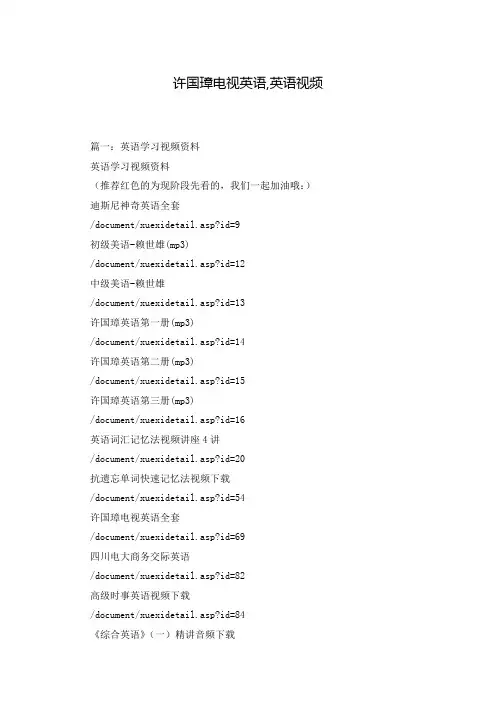
许国璋电视英语,英语视频篇一:英语学习视频资料英语学习视频资料(推荐红色的为现阶段先看的,我们一起加油哦:)迪斯尼神奇英语全套/document/xuexidetail.asp?id=9初级美语-赖世雄(mp3)/document/xuexidetail.asp?id=12中级美语-赖世雄/document/xuexidetail.asp?id=13许国璋英语第一册(mp3)/document/xuexidetail.asp?id=14许国璋英语第二册(mp3)/document/xuexidetail.asp?id=15许国璋英语第三册(mp3)/document/xuexidetail.asp?id=16英语词汇记忆法视频讲座4讲/document/xuexidetail.asp?id=20抗遗忘单词快速记忆法视频下载/document/xuexidetail.asp?id=54许国璋电视英语全套/document/xuexidetail.asp?id=69四川电大商务交际英语/document/xuexidetail.asp?id=82高级时事英语视频下载/document/xuexidetail.asp?id=84《综合英语》(一)精讲音频下载/document/xuexidetail.asp?id=106 李阳-疯狂英语口语和听力四本书mp3 /document/xuexidetail.asp?id=107 新概念英语第一册(MP3版)/document/xuexidetail.asp?id=299 新概念英语第二册(MP3版)/document/xuexidetail.asp?id=300 新概念英语第三册(MP3版)/document/xuexidetail.asp?id=301 新概念英语第四册MP3/document/xuexidetail.asp?id=302 英语学习翻译/document/xuexidetail.asp?id=332 完整版刘畅词汇flash下载/document/xuexidetail.asp?id=333 洋话连篇MP3/document/xuexidetail.asp?id=334 商务英语基础/document/xuexidetail.asp?id=3492005新东方阅读flash-周雷(全)/document/xuexidetail.asp?id=351 大学英语听力mp3/document/xuexidetail.asp?id=353 英语随口说[MP3] 练习口语好资料/document/xuexidetail.asp?id=488 新东方演讲-江博/document/xuexidetail.asp?id=646 新东方演讲-俞敏洪/document/xuexidetail.asp?id=647[西南师大][词汇学][14讲]/document/xuexidetail.asp?id=648 英语听力[音频]/document/xuexidetail.asp?id=649 英语专业翻译课程/document/xuexidetail.asp?id=650 交际英语(国家级)/document/xuexidetail.asp?id=651 新东方演讲-王强/document/xuexidetail.asp?id=652 英语3册(北京交通大学)/document/xuexidetail.asp?id=717 英语4册(北京交通大学)/document/xuexidetail.asp?id=718 高级时事英语(毛东辉)宁波电大/document/xuexidetail.asp?id=720 [上海外国语大学] 高级英语/document/xuexidetail.asp?id=893 综合英语视频教学资料/document/xuexidetail.asp?id=894 生活美语-语音下载/document/xuexidetail.asp?id=895 洋话连篇Ⅲ(视频RM)50集/document/xuexidetail.asp?id=896 李阳疯狂英语学习光盘/document/xuexidetail.asp?id=1137 疯狂英语900句2005精华版/document/xuexidetail.asp?id=1138 李阳疯狂英语/document/xuexidetail.asp?id=1166 高考英语语法/document/xuexidetail.asp?id=1198 高考英语听力/document/xuexidetail.asp?id=1199 高考英语阅读/document/xuexidetail.asp?id=1200 高考英语写作/document/xuexidetail.asp?id=1201 新东方《4+1口语语汇》/document/xuexidetail.asp?id=1214 新东方词汇112课FLASH讲解/document/xuexidetail.asp?id=1215 新概念英语全四册课本PDF版/document/xuexidetail.asp?id=1216 新概念英语视频第一册/document/xuexidetail.asp?id=1217 新概念英语视频第二册/document/xuexidetail.asp?id=1218 新概念英语视频第三册/document/xuexidetail.asp?id=1219 新概念英语视频第四册/document/xuexidetail.asp?id=1220 四川电大大学英语4(在线播放)/document/xuexidetail.asp?id=1228篇二:英语方面学习视频资料/subject/1932084//1310596/book.yoyobao/339320//bookstore/5441/book_17274844.html /isbn/978-7-5446-0471-0/ 资源名称---英语方面学习视频资料迪斯尼神奇英语全套/document/xuexidetail.asp?id=9初级美语-赖世雄(mp3)/document/xuexidetail.asp?id=12中级美语-赖世雄/document/xuexidetail.asp?id=13许国璋英语第一册(mp3)/document/xuexidetail.asp?id=14许国璋英语第二册(mp3)/document/xuexidetail.asp?id=15许国璋英语第三册(mp3)/document/xuexidetail.asp?id=16英语词汇记忆法视频讲座4讲/document/xuexidetail.asp?id=20抗遗忘单词快速记忆法视频下载/document/xuexidetail.asp?id=54从零开始学法语/document/xuexidetail.asp?id=55韩国语对话实习/document/xuexidetail.asp?id=68许国璋电视英语全套/document/xuexidetail.asp?id=69四川电大商务交际英语/document/xuexidetail.asp?id=82高级时事英语视频下载/document/xuexidetail.asp?id=84计算机专业英语在线教程/document/xuexidetail.asp?id=102 标准日语视频下载/document/xuexidetail.asp?id=105 《综合英语》(一)精讲音频下载/document/xuexidetail.asp?id=106 李阳-疯狂英语口语和听力四本书mp3 /document/xuexidetail.asp?id=107 《标准日语》初级视频下载/document/xuexidetail.asp?id=228 标准日本语中级视频/document/xuexidetail.asp?id=229 新概念英语第一册(MP3版)/document/xuexidetail.asp?id=299 新概念英语第二册(MP3版)/document/xuexidetail.asp?id=300 新概念英语第三册(MP3版)/document/xuexidetail.asp?id=301 新概念英语第四册MP3/document/xuexidetail.asp?id=302 英语学习翻译/document/xuexidetail.asp?id=332 完整版刘畅词汇flash下载/document/xuexidetail.asp?id=333 洋话连篇MP3/document/xuexidetail.asp?id=334 商务英语基础/document/xuexidetail.asp?id=349 2005新东方阅读flash-周雷(全)/document/xuexidetail.asp?id=351 大学英语听力mp3/document/xuexidetail.asp?id=353 youandme阶梯儿童英语字母学习/document/xuexidetail.asp?id=387 youandme阶梯儿童英语第一单元/document/xuexidetail.asp?id=388 /document/xuexidetail.asp?id=393 youandme阶梯儿童英语第三单元/document/xuexidetail.asp?id=394 youandme阶梯儿童英语第四单元/document/xuexidetail.asp?id=395 youandme阶梯儿童英语第五单元/document/xuexidetail.asp?id=396 开放英语/document/xuexidetail.asp?id=397 裕兴新概念英语FLASH全集/document/xuexidetail.asp?id=421 youandme阶梯儿童英语第六单元/document/xuexidetail.asp?id=479 youandme阶梯儿童英语第七单元/document/xuexidetail.asp?id=480 youandme阶梯儿童英语第八单元/document/xuexidetail.asp?id=481 youandme阶梯儿童英语第九单元/document/xuexidetail.asp?id=482 youandme阶梯儿童英语第十单元/document/xuexidetail.asp?id=483 /document/xuexidetail.asp?id=484youandme阶梯儿童英语第十二单元/document/xuexidetail.asp?id=485youandme阶梯儿童英语第十三单元/document/xuexidetail.asp?id=486youandme阶梯儿童英语第十四单元/document/xuexidetail.asp?id=487 英语随口说[MP3] 练习口语好资料/document/xuexidetail.asp?id=488 考研英语(2006)--阅读[FLASH]/document/xuexidetail.asp?id=645 新东方演讲-江博/document/xuexidetail.asp?id=646 新东方演讲-俞敏洪/document/xuexidetail.asp?id=647[西南师大][词汇学][14讲]/document/xuexidetail.asp?id=648 英语听力[音频]/document/xuexidetail.asp?id=649 英语专业翻译课程/document/xuexidetail.asp?id=650篇三:许国璋英语第一册课文、语法、对话文本许国璋英语第一册课文、语法、对话文本第二课a pen pensa map mapsa pet petsa spade spadesa letter letters一支钢笔钢笔(复数)一张地图地图(复数)一只宠物宠物(复数)一把锹锹(复数)一封信信(复数)第三课This is a pen.Is this a pen?That is a pencil.Is that a pencil?This is a desk.Is this a desk?That is a table.Is that a table?This is a disc.Is this a disc?That is a tape.Is that a tape?这是一支钢笔。
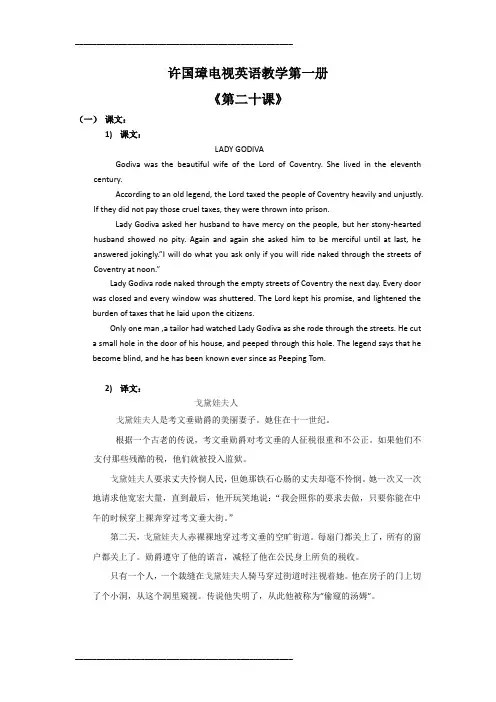
许国璋电视英语教学第一册《第二十课》(一)课文:1)课文:LADY GODIVAGodiva was the beautiful wife of the Lord of Coventry. She lived in the eleventh century.According to an old legend, the Lord taxed the people of Coventry heavily and unjustly.If they did not pay those cruel taxes, they were thrown into prison.Lady Godiva asked her husband to have mercy on the people, but her stony-hearted husband showed no pity. Again and again she asked him to be merciful until at last, he answered jokingly.”I will do what you ask only if you will ride naked through the streets of Coventry at noon.”Lady Godiva rode naked through the empty streets of Coventry the next day. Every door was closed and every window was shuttered. The Lord kept his promise, and lightened the burden of taxes that he laid upon the citizens.Only one man ,a tailor had watched Lady Godiva as she rode through the streets. He cuta small hole in the door of his house, and peeped through this hole. The legend says that hebecome blind, and he has been known ever since as Peeping Tom.2)译文:戈黛娃夫人戈黛娃夫人是考文垂勋爵的美丽妻子。
许国璋电视英语教学第一册《第二十一课》(一)课文:1)课文原文:A DAY OF HARVESTING( A Page from a student’s Diary)October 24.Today we began harvesting. We got up at daybreak, and after an early breakfast, we started off for the rice fields. We got there after half an hour’s walk.The fields around us looked like a golden sea. I have never seen anything so beautiful! We worked side by side with the farmers. At first some of us were ratherslow. The farmers showed us how to cut the rice and how to tie the bundles. Soonwe learned to work faster.We worked in three groups. “ Faster, faster! We mustn’t fall behind the others!”That was the thought in everybody’s mind.Evening came before we realize it. We put down our sickles and looked at each other. Our clothes were wet with sweat. On every face there was a smile.We harvested thirty mu altogether. That was not bad for the first day. But tomorrow we shall certainly do better- much better.2)课文译文:收割的一日(学生日记一则)10月24日我们今天开始收割。
许国璋英语第一册单词peasantn. 农民spaden. 锹pickn. 镐monitorn. 班长dictationn. 听写nurseryn. 托儿所physicsn. 物理学clearlyadv. 清楚地collegen. 学院subjectn. 学科slogann. 标语graden. 级amongprep. 在…当中membern. 成员Leaguen. 团(大写指共青团) secretaryn. 书记classmaten. 同班同学quartern. 一刻钟suppern. 晚饭dialoguen. 对话Tuesdayn. 星期二Sundayn. 星期日Monday n. 星期一Wednesdayn. 星期三Thursdayn. 星期四Fridayn. 星期五Saturdayn. 星期六spellingn. 拼写exercisen. 练习;锻炼reviewv. 复习grammarn. 语法wholeadj. 全部,整个springn. 春天gayadj. 欢乐flowern. 花summern. 夏天autumnn. 秋天richadj. 丰富;富有fruitn. 水果grainn. 谷物,五谷wintern. 冬天bringsv. 带来(第三人称单数)seasonn. 季节monthn. 月Januaryn. 一月Februaryn. 二月Marchn. 三月Apriln. 四月Mayn. 五月Junen. 六月Julyn. 七月Augustn. 八月Septembern. 九月Octobern. 十月Novembern. 十一月Decembern. 十二月northadj. 北方的,北polen. 极the North Pole北极tropicsn. 热带rainyadj. 多雨的dryadj. 干的,旱的freshadj. 新鲜的attendvt. 出席,参加lecturen. 讲演课,讲演practisevt. 练习libraryn. 图书馆restn. 休息sportn. 运动trackn. 跑道gardenn. 花园broadcastn. 广播preparevt. 准备steel worksn. 钢铁厂elderadj. 年长的middleadj. & n. 中等;中间hospitaln. 医院factoryn. 工厂parentsn. 双亲Pioneern. 少先队员instituten. 学院friendn. 朋友dearadj. 亲爱的seventhnum. 第七interestingadj. 有趣,有意思communistadj. 共产主义的kindn. 种类activityn. 活动farmn. 农场dancen. 舞会warmadj. 温暖sunnyadj. 阳光充足的;晴朗outingn. 郊游harvestn. 收割communen. 公社weathern. 天气especiallyadv. 特别地seldomadv. 不常,很少地universityn. 大学foreignadj. 外国的neighborhoodn. 邻里(总称) servicen. 服务centren. 中心;中央mendvt. 修补(衣服等) countern. 柜台toweln. 毛巾soapn. 肥皂(不可数名词) sewvi. 缝shirtn. 衬衫patchvt. 补pairn. 双trousersn. 裤子a pair of trousers一条裤子neighborn. 邻居to play a part (在…中)起作用importantadj. 重要的socialistadj. 社会主义的constructionn. 建设(不可数名词) department n. 系plantvt. 种cabbagen. 洋白菜,甘蓝activeadj. 积极的physicaladj. 体力的labourn. 劳动(不可数名词)coatn. 大衣;男上装clothesn. 衣服sockn. 短袜parkn. 公园hundrednum. 一百benchn. 长凳chatvi. 谈天hugeadj. 巨大的pinen. 松树chessn. 棋whiteadj. 白发的hairn. 头发knitvt. 织(毛线等)sunshinen. 阳光(不可数名词)grandchildn. 孙儿,孙女;外孙grassn. 草;草地faradv. 远exhibitionn. 展览会concertn. 音乐会announcementn. 通知currentadj. 现时的affairn. 事务dailyn. 日报situationn. 情况,形势African. 非洲shallaux. & v. 将discussvt. 讨论politicaladj. 政治的essayn. 论文;短论practicen. 实践;练习slipn. 小片,纸片handvt. 交,递hand in交来,呈交one more thing还有一件事teamn. 队matchn. 比赛cheervt. & vi. 欢呼;喝采That's all.(讲话结束时用语)完了paragraphn. 段translatevt. 翻译intoprep. 进入;成为oraladj. 口头的signn. (在此处)布告litterv. 乱丢废物throughprep. 直到wait forvi. 等候unusualadj. 异常的duringprep. 在…期间examinationn. 考试quietlyadv. 轻轻地quietadj. 安静mustn'tmod. & v. 切勿obeyvt. 服从,遵守floorn. 地板rulen. 规章,规则borrowvt. 借(入)cardn. 卡片library card借书证call number书号librariann. 图书馆管理员,馆长gladadj. 高兴的,乐意的to do a good job把一件工作做好quicklyadv. 快sweepvt. 扫dustvt. 掸去(灰尘)caren. 照顾to take care of管;负责radiatorn. 暖气片ratheradv. 相当地putvt. 放idean. 主意,意见authorn. 作者storyn. 故事noveln. 长篇小说dictionaryn. 字典revolutionn. 革命greatadj. 伟大的,大的revolutionaryadj. 革命的leadern. 领袖;领导人the working class工人阶级inspiringadj. 鼓舞人心的be born出生movementn. 运动simplyadv. 简单地;朴素地usefuladj. 有用的weaponn. 武器strugglen. 斗争dealn. 数量a great deal大量,很多fulladj. 完全的;充满的carefully adv. 仔细地leavevt. & vi. 留下;离开examplen. 榜样,范例mistaken. 错误carefuladj. 细心;小心enoughadj. & adv. 足够progressn. 进步(不可数名词)to make progress有进步,取得进步handwritingn. 书法pooradj. 差attentionn. 注意(不可数名词)to pay attention(给予)注意cockn. 公鸡crowvt. 啼叫midnightn. 午夜,半夜landlordn. 地主slyadj. 狡猾的greedyadj. 贪婪的farmhandn. 长工,雇工naturallyadv. 自然地hatevt. 恨strangeadj. 奇怪的habitn. 习惯dawnn. 黎明every time每一次,每当lazy-bonesn. 懒骨头deepadj. 深hatredn. 恨bothpron. 两者both...and...既…又…stealvt. & vi. 偷;偷入courtyardn. 院子trickn. 诡计angryadj. 生气,愤怒decidevt. 决定cryvt. 叫,喊thiefn. 贼immediatelyadv. 立刻,马上knockvt. 敲,打beatvt. 打beatingn. 打no longer不再clinicn. 诊疗所;医务所fevern. 发烧medicinen. 药temperaturen. 温度;体温headachen. 头痛worryvi. 着急,担心catchvt. 抓住to catch up赶上harvestingn. 收割diaryn. 日记daybreakn. 黎明startvi. 动身(往…去)ricen. 稻;米饭fieldn. 田野;田地aroundprep. & adv. 在…周围goldenadj. 金黄色的side by side with和…并肩slowadj. 慢的bundlen. 束,捆fallvi. 落fall behind落在后面thoughtn. 想法mindn. 脑子,心realizevt. 意识到sicklen. 镰刀sweatn. 汗mun. 亩altogetheradv. 一共certainlyadv. 肯定地bathn. 洗澡take a bath洗个澡had better最好hurry up赶快minuten. 分钟forgetvt. 忘记lightn. 光;灯光villagen. 村子ploughvt. 翻耕tooln. 工具wheatn. 麦子placen. 地方besideprep. 在…旁边wideadj. 宽阔的at the foot of在…脚下buildingn. 楼房,建筑物streetn. 街everywhereadv. 到处sadadj. 可悲的,阴郁的dirtyadj. 肮脏的merchantn. 商人unhealthyadj. 不卫生的hutn. 小茅屋narrowadj. 狭窄的muddyadj. 泥泞的nearly adv. 几乎leadvt. 领导ridvt. 使…去掉mudn. 烂泥dirtn. 污物theatern. 戏院flatn. 一套住房assembly halln. 礼堂,大会堂alongprep. 沿(河,路等)buildvt. 建造;建设hoteln. 旅馆talladj. 高chimneyn. 烟囱spring up跃起;(引伸为)出现steamern. 汽船busilyadv. 忙碌地productn. 产品industryn. 工业provincen. 省healthyadj. 健康的go all out鼓足干劲socialismn. 社会主义envelopen. 信封bottlen. 瓶centn. 分(钱)run out of用完bearn. 熊travelvi. 旅行togetheradv. 一起forestn. 森林wildadj. 野的beastn. 兽suddenlyadv. 突然hidevt. & vi. 躲藏leafn. 树叶climbvt. 爬throwvt. 投,抛掷groundn. 地pretendvt. 假装deadadj. 死sniffvi. 闻,嗅headn. 头nosen. 鼻子mouthn. 嘴earn. 耳朵holdvt. 抓住,握住breathn. 呼吸to hold one's breath憋住气,屏气touchvt. 碰,触及safeadj. 安全的trustvt. 信任momentn. 时刻difficultadj. 困难的difficultyn. 困难indeedadv. 确实地dining-roomn. 食堂fishn. 鱼vegetablen. 蔬菜soupn. 汤steamedadj. 蒸熟的breadn. 面包steamed bread馒头noodlen. 面条dishn. 碟子bowln. 碗chopsticksn. 筷子spoonn. 汤匙drinkvt. 喝mealn. 一顿饭(三餐的通称)cookn. 炊事员leaflessadj. 没有叶子的snowfalln. 一场雪strayvi. 偏离,离开earnestlyadv. 认真地Warsawn. 华沙(波兰首都) Polandn. 波兰conquervt. 征服Tsarn. 沙皇allowvt. 允许Polishadj. 波兰的;波兰语pupiln. 小学生althoughconj. 尽管,虽然spyn. 密探,特务brightadj. 聪明的,伶俐的faintadj. 微弱的belln. 铃声fearfullyadv. 胆怯地signaln. 信号ringn. 铃声,钟声grabvt. (猛然)抓swiftlyadv. 迅速地sewingn. 缝纫,缝制物materialsn. 衣料,材料embroidervt. 绣花squaren. 方块clothn. 布outer adj. 外部的inspectorn. 督学;检查员chargen. 负责;责任privateadj. 私立的,私人的tight-fittingadj. 紧身的uniformn. 制报Mademoiselle(法语)小姐demandvt. 查问,要求fairy talen. 神话,童话gruntn. 哼声,咕哝声approvaln. 同意,赞成risevi. 站起来recitevt. 背诵the Lord's Prayer主祷文ordervt. 命令feelingsn. 感情imperialadj. 帝国的,皇家的rulern. 统治者paleadj. (脸色)苍白patriotn. 爱国者agreevi. 同意,赞同stirvi. 骚动,轰动。
许国璋电视英语,英语视频篇一:英语学习视频资料英语学习视频资料(推荐红色的为现阶段先看的,我们一起加油哦:)迪斯尼神奇英语全套/document/xuexidetail.asp?id=9初级美语-赖世雄(mp3)/document/xuexidetail.asp?id=12中级美语-赖世雄/document/xuexidetail.asp?id=13许国璋英语第一册(mp3)/document/xuexidetail.asp?id=14许国璋英语第二册(mp3)/document/xuexidetail.asp?id=15许国璋英语第三册(mp3)/document/xuexidetail.asp?id=16英语词汇记忆法视频讲座4讲/document/xuexidetail.asp?id=20抗遗忘单词快速记忆法视频下载/document/xuexidetail.asp?id=54许国璋电视英语全套/document/xuexidetail.asp?id=69四川电大商务交际英语/document/xuexidetail.asp?id=82高级时事英语视频下载/document/xuexidetail.asp?id=84《综合英语》(一)精讲音频下载/document/xuexidetail.asp?id=106 李阳-疯狂英语口语和听力四本书mp3 /document/xuexidetail.asp?id=107 新概念英语第一册(MP3版)/document/xuexidetail.asp?id=299 新概念英语第二册(MP3版)/document/xuexidetail.asp?id=300 新概念英语第三册(MP3版)/document/xuexidetail.asp?id=301 新概念英语第四册MP3/document/xuexidetail.asp?id=302 英语学习翻译/document/xuexidetail.asp?id=332 完整版刘畅词汇flash下载/document/xuexidetail.asp?id=333 洋话连篇MP3/document/xuexidetail.asp?id=334 商务英语基础/document/xuexidetail.asp?id=3492005新东方阅读flash-周雷(全)/document/xuexidetail.asp?id=351 大学英语听力mp3/document/xuexidetail.asp?id=353 英语随口说[MP3] 练习口语好资料/document/xuexidetail.asp?id=488 新东方演讲-江博/document/xuexidetail.asp?id=646 新东方演讲-俞敏洪/document/xuexidetail.asp?id=647[西南师大][词汇学][14讲]/document/xuexidetail.asp?id=648 英语听力[音频]/document/xuexidetail.asp?id=649 英语专业翻译课程/document/xuexidetail.asp?id=650 交际英语(国家级)/document/xuexidetail.asp?id=651 新东方演讲-王强/document/xuexidetail.asp?id=652 英语3册(北京交通大学)/document/xuexidetail.asp?id=717 英语4册(北京交通大学)/document/xuexidetail.asp?id=718 高级时事英语(毛东辉)宁波电大/document/xuexidetail.asp?id=720 [上海外国语大学] 高级英语/document/xuexidetail.asp?id=893 综合英语视频教学资料/document/xuexidetail.asp?id=894 生活美语-语音下载/document/xuexidetail.asp?id=895 洋话连篇Ⅲ(视频RM)50集/document/xuexidetail.asp?id=896 李阳疯狂英语学习光盘/document/xuexidetail.asp?id=1137 疯狂英语900句2005精华版/document/xuexidetail.asp?id=1138 李阳疯狂英语/document/xuexidetail.asp?id=1166 高考英语语法/document/xuexidetail.asp?id=1198 高考英语听力/document/xuexidetail.asp?id=1199 高考英语阅读/document/xuexidetail.asp?id=1200 高考英语写作/document/xuexidetail.asp?id=1201 新东方《4+1口语语汇》/document/xuexidetail.asp?id=1214 新东方词汇112课FLASH讲解/document/xuexidetail.asp?id=1215 新概念英语全四册课本PDF版/document/xuexidetail.asp?id=1216 新概念英语视频第一册/document/xuexidetail.asp?id=1217 新概念英语视频第二册/document/xuexidetail.asp?id=1218 新概念英语视频第三册/document/xuexidetail.asp?id=1219 新概念英语视频第四册/document/xuexidetail.asp?id=1220 四川电大大学英语4(在线播放)/document/xuexidetail.asp?id=1228篇二:英语方面学习视频资料/subject/1932084//1310596/book.yoyobao/339320//bookstore/5441/book_17274844.html /isbn/978-7-5446-0471-0/ 资源名称---英语方面学习视频资料迪斯尼神奇英语全套/document/xuexidetail.asp?id=9初级美语-赖世雄(mp3)/document/xuexidetail.asp?id=12中级美语-赖世雄/document/xuexidetail.asp?id=13许国璋英语第一册(mp3)/document/xuexidetail.asp?id=14许国璋英语第二册(mp3)/document/xuexidetail.asp?id=15许国璋英语第三册(mp3)/document/xuexidetail.asp?id=16英语词汇记忆法视频讲座4讲/document/xuexidetail.asp?id=20抗遗忘单词快速记忆法视频下载/document/xuexidetail.asp?id=54从零开始学法语/document/xuexidetail.asp?id=55韩国语对话实习/document/xuexidetail.asp?id=68许国璋电视英语全套/document/xuexidetail.asp?id=69四川电大商务交际英语/document/xuexidetail.asp?id=82高级时事英语视频下载/document/xuexidetail.asp?id=84计算机专业英语在线教程/document/xuexidetail.asp?id=102 标准日语视频下载/document/xuexidetail.asp?id=105 《综合英语》(一)精讲音频下载/document/xuexidetail.asp?id=106 李阳-疯狂英语口语和听力四本书mp3 /document/xuexidetail.asp?id=107 《标准日语》初级视频下载/document/xuexidetail.asp?id=228 标准日本语中级视频/document/xuexidetail.asp?id=229 新概念英语第一册(MP3版)/document/xuexidetail.asp?id=299 新概念英语第二册(MP3版)/document/xuexidetail.asp?id=300 新概念英语第三册(MP3版)/document/xuexidetail.asp?id=301 新概念英语第四册MP3/document/xuexidetail.asp?id=302 英语学习翻译/document/xuexidetail.asp?id=332 完整版刘畅词汇flash下载/document/xuexidetail.asp?id=333 洋话连篇MP3/document/xuexidetail.asp?id=334 商务英语基础/document/xuexidetail.asp?id=349 2005新东方阅读flash-周雷(全)/document/xuexidetail.asp?id=351 大学英语听力mp3/document/xuexidetail.asp?id=353 youandme阶梯儿童英语字母学习/document/xuexidetail.asp?id=387 youandme阶梯儿童英语第一单元/document/xuexidetail.asp?id=388 /document/xuexidetail.asp?id=393 youandme阶梯儿童英语第三单元/document/xuexidetail.asp?id=394 youandme阶梯儿童英语第四单元/document/xuexidetail.asp?id=395 youandme阶梯儿童英语第五单元/document/xuexidetail.asp?id=396 开放英语/document/xuexidetail.asp?id=397 裕兴新概念英语FLASH全集/document/xuexidetail.asp?id=421 youandme阶梯儿童英语第六单元/document/xuexidetail.asp?id=479 youandme阶梯儿童英语第七单元/document/xuexidetail.asp?id=480 youandme阶梯儿童英语第八单元/document/xuexidetail.asp?id=481 youandme阶梯儿童英语第九单元/document/xuexidetail.asp?id=482 youandme阶梯儿童英语第十单元/document/xuexidetail.asp?id=483 /document/xuexidetail.asp?id=484youandme阶梯儿童英语第十二单元/document/xuexidetail.asp?id=485youandme阶梯儿童英语第十三单元/document/xuexidetail.asp?id=486youandme阶梯儿童英语第十四单元/document/xuexidetail.asp?id=487 英语随口说[MP3] 练习口语好资料/document/xuexidetail.asp?id=488 考研英语(2006)--阅读[FLASH]/document/xuexidetail.asp?id=645 新东方演讲-江博/document/xuexidetail.asp?id=646 新东方演讲-俞敏洪/document/xuexidetail.asp?id=647[西南师大][词汇学][14讲]/document/xuexidetail.asp?id=648 英语听力[音频]/document/xuexidetail.asp?id=649 英语专业翻译课程/document/xuexidetail.asp?id=650篇三:许国璋英语第一册课文、语法、对话文本许国璋英语第一册课文、语法、对话文本第二课a pen pensa map mapsa pet petsa spade spadesa letter letters一支钢笔钢笔(复数)一张地图地图(复数)一只宠物宠物(复数)一把锹锹(复数)一封信信(复数)第三课This is a pen.Is this a pen?That is a pencil.Is that a pencil?This is a desk.Is this a desk?That is a table.Is that a table?This is a disc.Is this a disc?That is a tape.Is that a tape?这是一支钢笔。
许国璋英语第二册《第一课》(一)课文:THE LARGEST LEND AND MOST POPULOUSAsia is the largest of the continents of the world. It is a larger than Africa, larger than eitherof the two Americas, and four times as large as Europe. Asia and Europe form a huge land mass. Indeed Europe is so much smaller than Asia that some geographers regard Europe as a peninsula of Asia.亚洲是世界上最大的洲。
它比非洲大,比两个美洲大,是欧洲的四倍。
亚洲和欧洲形成了巨大的陆地。
事实上,欧洲比亚洲小得多,一些地理学家把欧洲视为亚洲半岛。
Many geographers say that the Ural Mountains form the dividing line between Europe and Asia. Some think differently. But all geographers agree that Asia was once linked to North America. Or, to be more exact, Alaska was at one time connected with the tip Siberia. The ancestors of American Indians, geographers say, were Asians. 30000 years ago they went across the land bridge and settled down in new homes.许多地理学家说乌拉尔山脉形成了欧洲和亚洲的分界线。
许国璋电视英语教学第一册《第十四课》(一)课文:1)课文原文:A LETTER TO A FRIENDBeijingOctober 21, 1961Dear Li Ying,How time flies! This is already my seventh week at college. We are very busy here and life is very interesting. There are so many new things to learn. We haveEnglish lessons every day and I like them very much. We also study Chinese andWorld History.After class we have all kinds of activities. Sometimes we work on the college farm. On Saturday afternoon we usually have our class meeting. Sometimes welisten to a report. On Saturday evening there is a film or a dance.Autumn is the best season in Beijing. The days are warm and sunny. We are planning an outing for next Sunday.How are you? Are you still busy with the harvest? Please write to me soon and tell me about your life as a teacher.Yours ever,Wu Ming2)课文译文:给朋友的信北京1961年10月21日亲爱的李颖,时间过得真快!这已经是我上大学的第七周了。
我们这里很忙,生活很有趣。
有很多新东西要学。
我们每天都上英语课,我非常喜欢它们。
我们还学习汉语文学和世界历史。
课后我们有各种各样的活动。
有时我们在大学农场工作。
星期六下午我们通常开班会。
有时我们听报告。
星期六晚上有时看电影或跳舞。
秋天是北京最好的季节。
天气温暖晴朗。
我们计划下星期日郊游。
你好吗?你还在忙着收割吗?请尽快给我写信,告诉我你作为教师的生活。
你的,吴明3)课堂笔记:1.October 21,1961读:October (the ) twenty-first , nineteen sixty-one英式写法:21 October, 1961读:the twenty- first of October, nineteen sixty-one2.How time flies!(感叹句)3.There are so many new things to learn.Learn 与Study的不同,study 有研究的意思,We also study Chinese and World History.4.For (约定的时间)We are planning an outing for next Sunday.A meeting for MondayA dance for tomorrow5.Be busy with (忙于…)Are you still busy with the harvest?I’m very busy with my work.(二)DIALGUE:(对话)1)原文:WEATHER-What’s the weather like in your hometown?-It’s very nice. It’s usually warm and sunny in spring and autumn.-Does it often rain there?-Yes, it does, especially in summer.-Is it very cold in winter?-No, it isn’t. it seldom snows there.2)对话译文:天气—你家乡的天气怎么样?—非常好,在春天和秋天通常都是温暖和阳光明媚的。
—那里经常下雨吗?—是的,特别是在夏天。
—那里冬天非常冷吗?—不,不很冷。
那里冬天很少下雪3)课堂笔记:1.描述天气的一些形容词:Awful, cool, windy, cloudy, foggy, clear, dry, damp, humid, stormy,(三)语法:特殊疑问句1.疑问代词:Who, whom whose, what, which疑问副词:when, where, how, why2.特殊问句例句,注意问的句子那部份:a)Who knows the way to the airport?(对主语提问)b)Whom(who)do they work for?(对宾语提问)c)Whose key is it?(对定语提问)d)What do you have for breakfast?(对宾语提问)e)What subjects do you study at school?(对定语提问)f)What is on tonight?(对主语提问)g)What makes it so hot today?(对主语提问)h)What are these?(对表语提问)i)Which book do you like?(对定语提问)j)When do you go to work?(对时间状语提问)k)Where do you live?(对地点状语提问)l)Where is the bus-stop?(对表语提问)m)How do you like the film?(对方式状语提问)n)How many pictures are there on the wall?o)How often do you write to your family?p)Why do you do this?(对原因状语提问)3.特殊问句的三个特点:a)对主语提问,特殊疑问句采用陈述句形式,不加助动词。
b)对其他成分提问,疑问词后,跟一般问句。
c)疑问词所修饰的名词,形容词,副词,在提问时,要跟着疑问词。
4.对各部份提问:1)This is Mr. Liu’s pencil.Whose pencil is this?2)We have Chinese classes on Thursday morning.What classes do we have on Thursday morning?3)She prepares her lessons in the evening.What does she do in the evening?4)Wang Qing often goes to see Wu Ling.Who often goes to see Wu Ling?5)Wang Qing often goes to see Wu Ling.Who (whom) does Wang Qing often go to see?6)There are seven nurseries in that town.How many nurseries are there in that town?7)He is in Class Six.Which class is he in?5.特殊问句与一般疑问句:1)When does Wang Qing get up? ( Does Wang Qing get up at six?)2)Where do they come from?( Do they come from Shanghai?)3)What do you do after lunch? ( Do you take a short rest after lunch?)4)How do you like the film? ( Do you like the film?)5)What language does she study? ( Does she study German?)6)Which class is he in ?( Does he in Class Five?)7)How many pictures are there on the wall?( Are there any pictures on the wall?)8)Whose textbook is this?( is this your textbook?)9)Who lives in this room?( Li Ying lives in this room.)10)How many comrades live in this room?( Four comrades live in this room?)6.对句子各部份的提问:例一:Wang Qing reviews his English lessons in the reading room every evening?1)Wang Qing reviews his English lessons in the reading room every evening?Who reviews his English lessons in the reading room every evening?(主语)2)Wang Qing reviews his English lessons in the reading room every evening?What does Wang Qing do every evening?(谓语)3)Wang Qing reviews his English lessons in the reading room every evening?What does Wang Qing reviews in the reading room every evening?(宾语)4)Wang Qing reviews his English lessons in the reading room every evening?What lessons does Wang Qing reviews in the reading room every evening?(定语)5)Wang Qing reviews his English lessons in the reading room every evening?(状)Where does Wang Qing reviews his English every evening?6)Wang Qing reviews his English lessons in the reading room every evening?(状)When does Wang Qing reviews his English in the reading room?例二: The teacher’s room is on the second floor.1)The teacher’s room is on the second floor.where is the teacher’s room?(表语)2)The teacher’s room is on the second floor.which room is on the second floor?(定语)7.基数词:1)基本表示:2)其他数目:3)年分读法:(四)EXERCISES:1.回答问题:1)Who is Wu Ming? Where does he study?He is a student of English, he studies in a college in Beijing.2)How is his life at college?It is very interesting.3)What does he study? Does he have English lessons every day ?Does he like them?He studies English, Chinese and the history of Chinese Communist Party.Yes, he does, he likes them very much.4)What activities do the students have after class?They have all kinds of activities. Sometimes they work on the college farm.5)What activities do they have on Saturday evening?They usually see the film or have a dance.6)When do they have their League meeting?On Saturday afternoon.7)What is the weather like in Beijing in autumn?Autumn is the best season in Beijing. The days are warm and sunny.8)What are the students planning to do next Sunday?They are planning an outing .(B)9)What language do you study?I study English.10)How many classes do you have in a week? How many of them are English classes?I have twenty classes in a week, of them twelve are English classes.11)Do you have English classes every day ?Yes, we do.12)What do you do after class?After class I usually review my lessons and do my homework. Then I read thenewspaper or listen to the English broadcast. After that I go for a walk in thecollege garden.13)What is the weather like these days?The days are warm and sunny.2.读出数字和时刻:1)12,19,20,40,85,103,276,800,2000,3500,50000Twelve, nineteen, twenty, forty, eighty-five, one hundred and three, twohundred and seventy- six, eight hundred, two thousand, three thousand fivehundred, fifty thousand,2)2:30,7:10,11:05,8:15,11:50,12:45,5:35,9:55 half past two, ten past seven, five past eleven, a quarter past eight, ten to twelve,a quarter to thirteen, five thirty-five, five to ten3.把下列各句中的斜体部分改为各种人称代词,并作其他必要的变动:1)jack does his homework in the evening.I do my home work in the evening.You do your home work in the evening.He does his homework in the evening.(she, her)They do their homework in the evening.(we, our; you ,your)2)I wash my clothes on Sunday afternoon.3)Jane often goes for a walk with her friend after supper.4)I like my new work.5)My father often writes to me.6)Her friend often comes to see her.4.就划线部份提问并回答:1)This is Comrade Liu’s pencil.Whose pencil is this?2)We have Chinese classes on Thursday morning.What classes do we have on Thursday morning?When do we have Chinese classes?3)She prepares her lessons in the evening.What does she do in the evening?When does she prepare her lessons ?4)Wang Qing often goes to see Wu Ling.Who often goes to see Wu Ling?Who does Wang Qing often go to see?5)There are seven nurseries in that commune.How many are there nurseries in that commune?6)He is in Class Six.What Class is he in?5.分析句子成份:1)How do you like your life here?2)Who are planning an outing for this Saturday?3)When do you usually listen to the English broadcast?4)How many schools are there in your home town?5)How often do you write to your parents?6.中译英:1.时间过得真快!How time flies!2.大学里有很多新的东西要学。